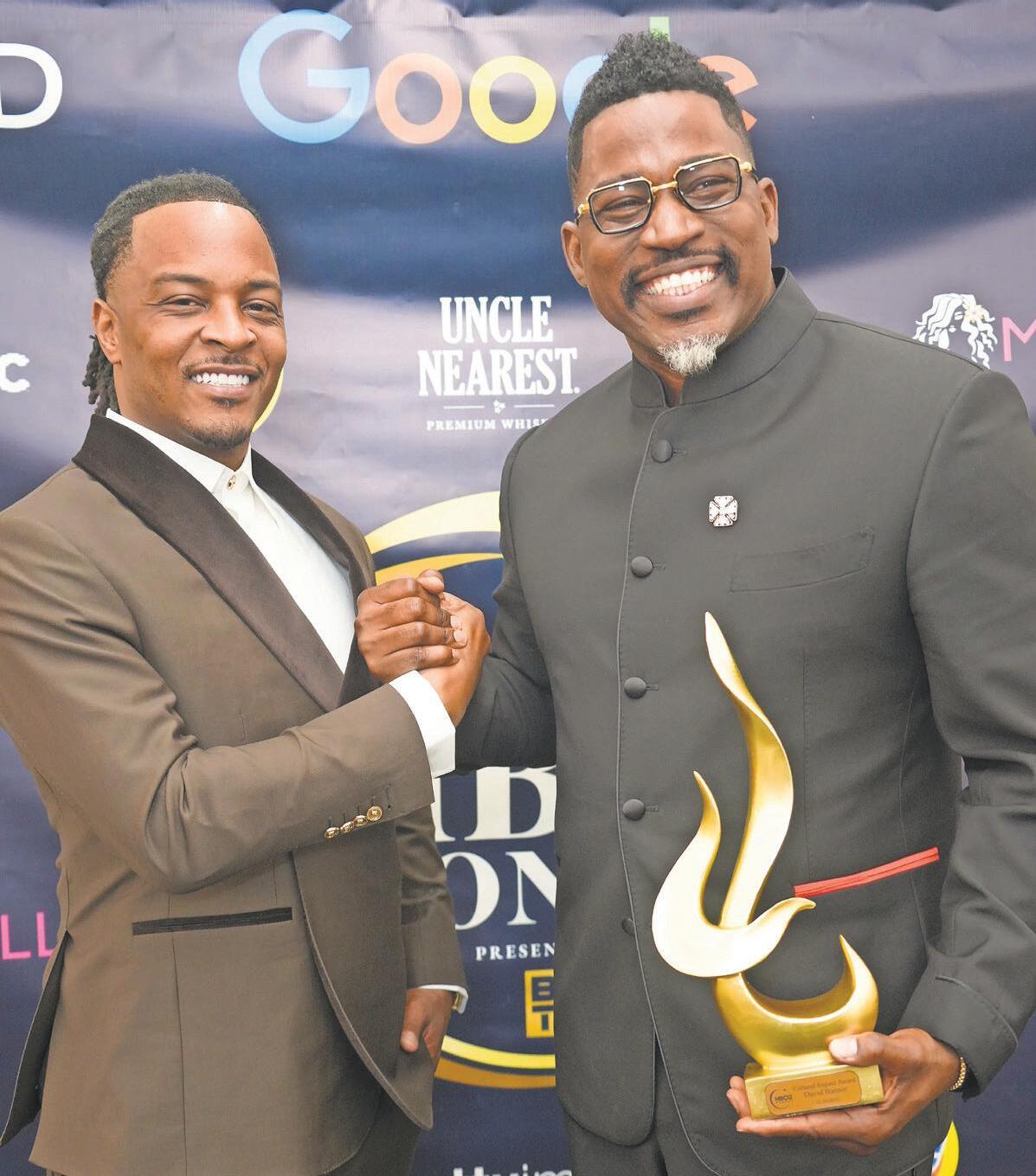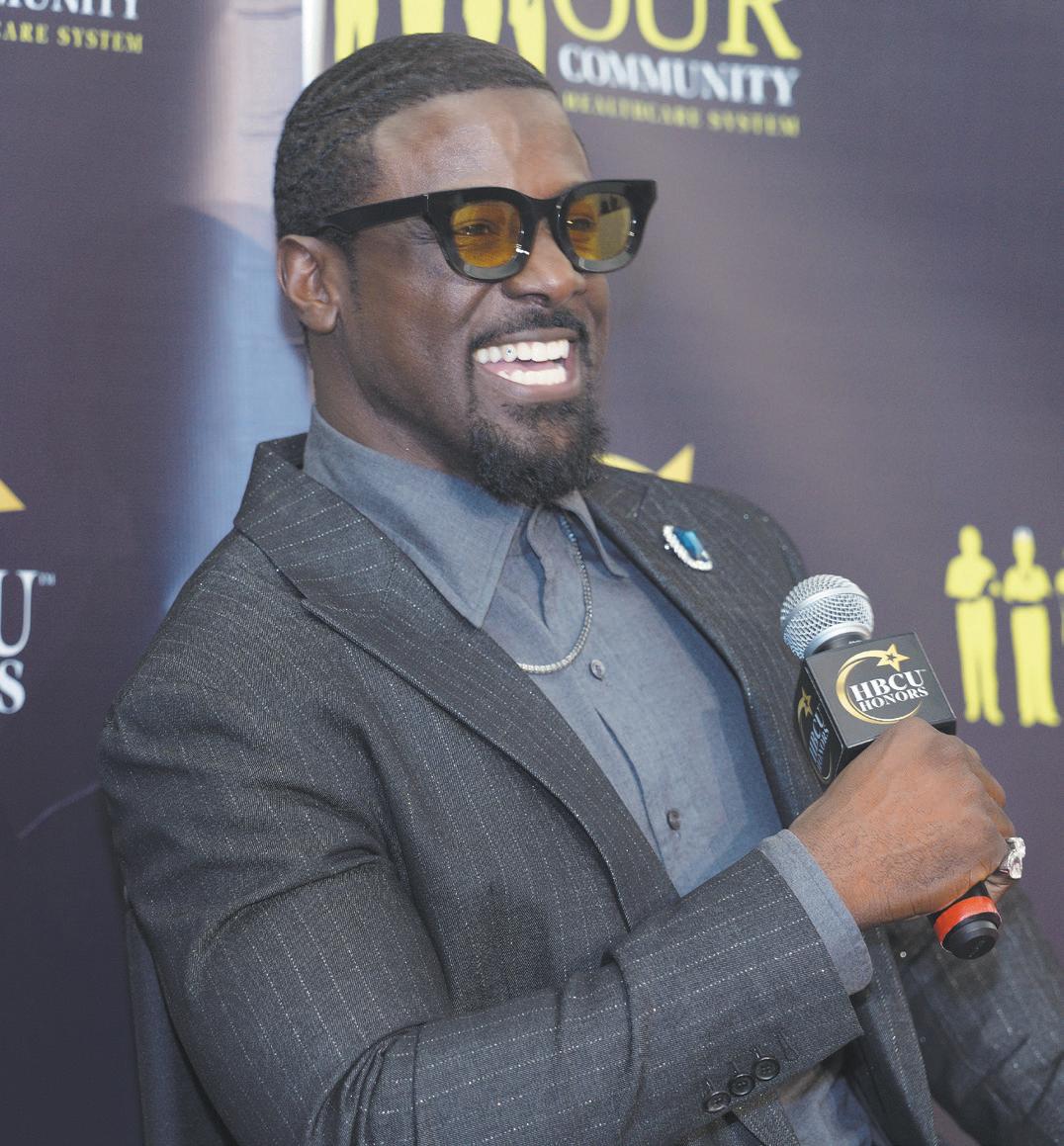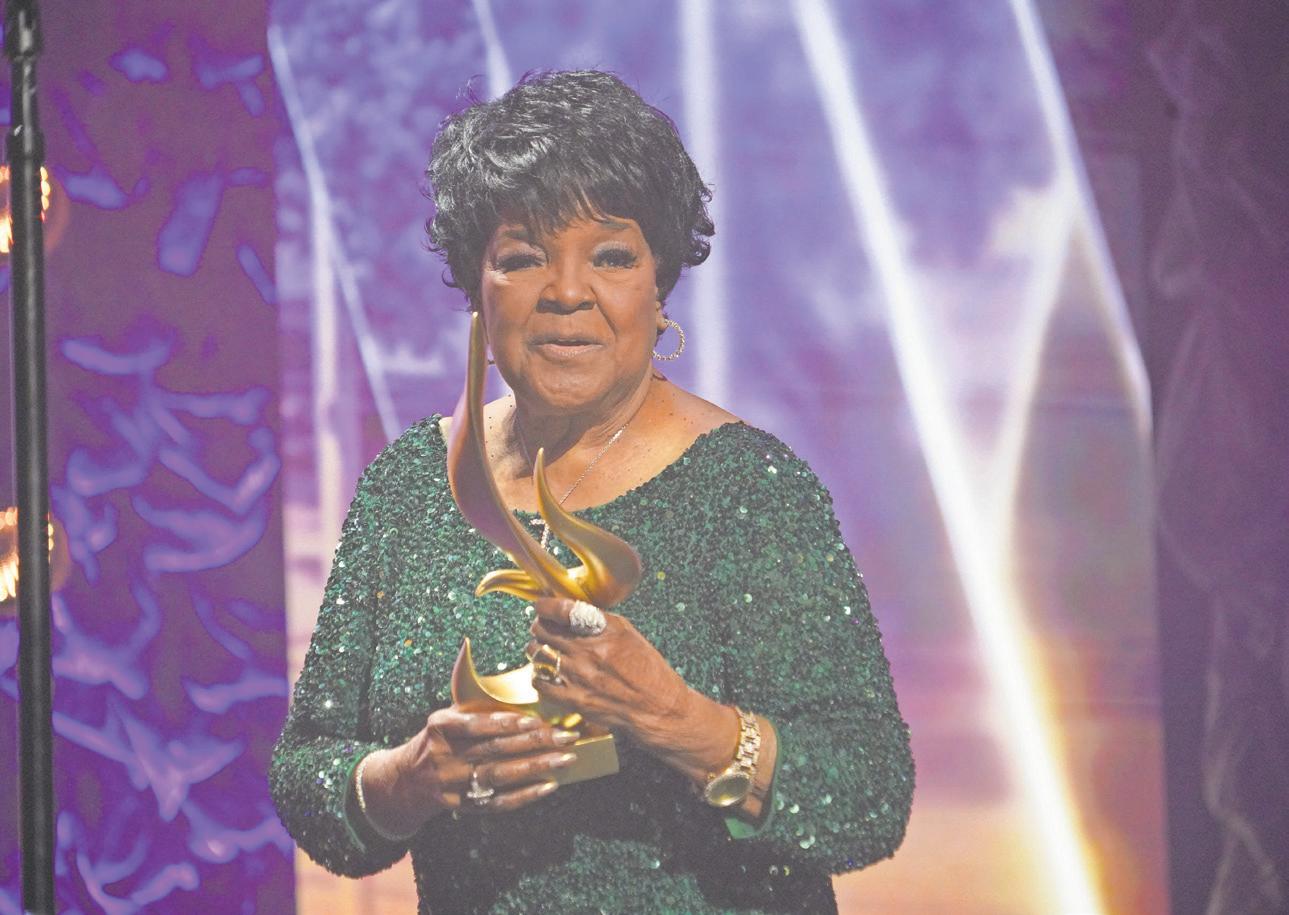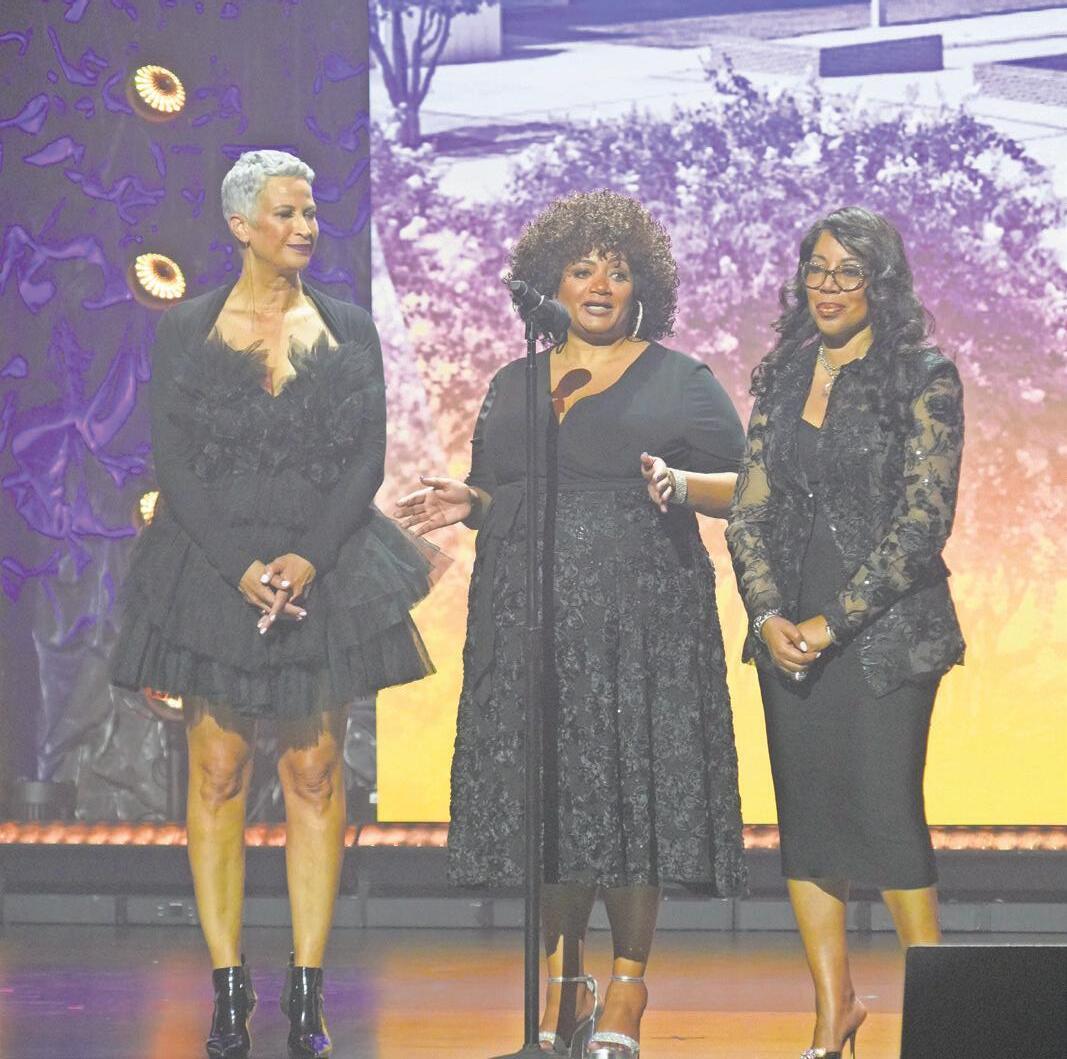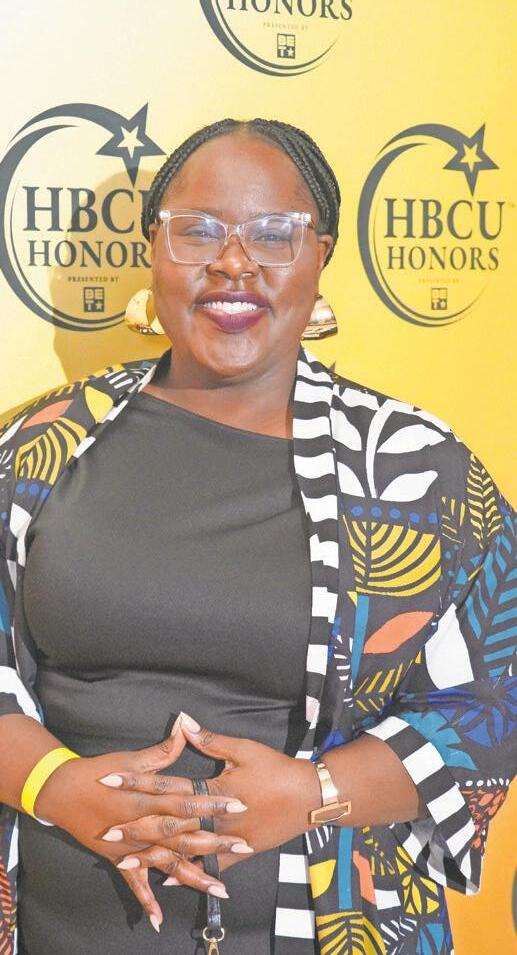
NOVEMBER 29, 2025 - DECEMBER 5, 2025
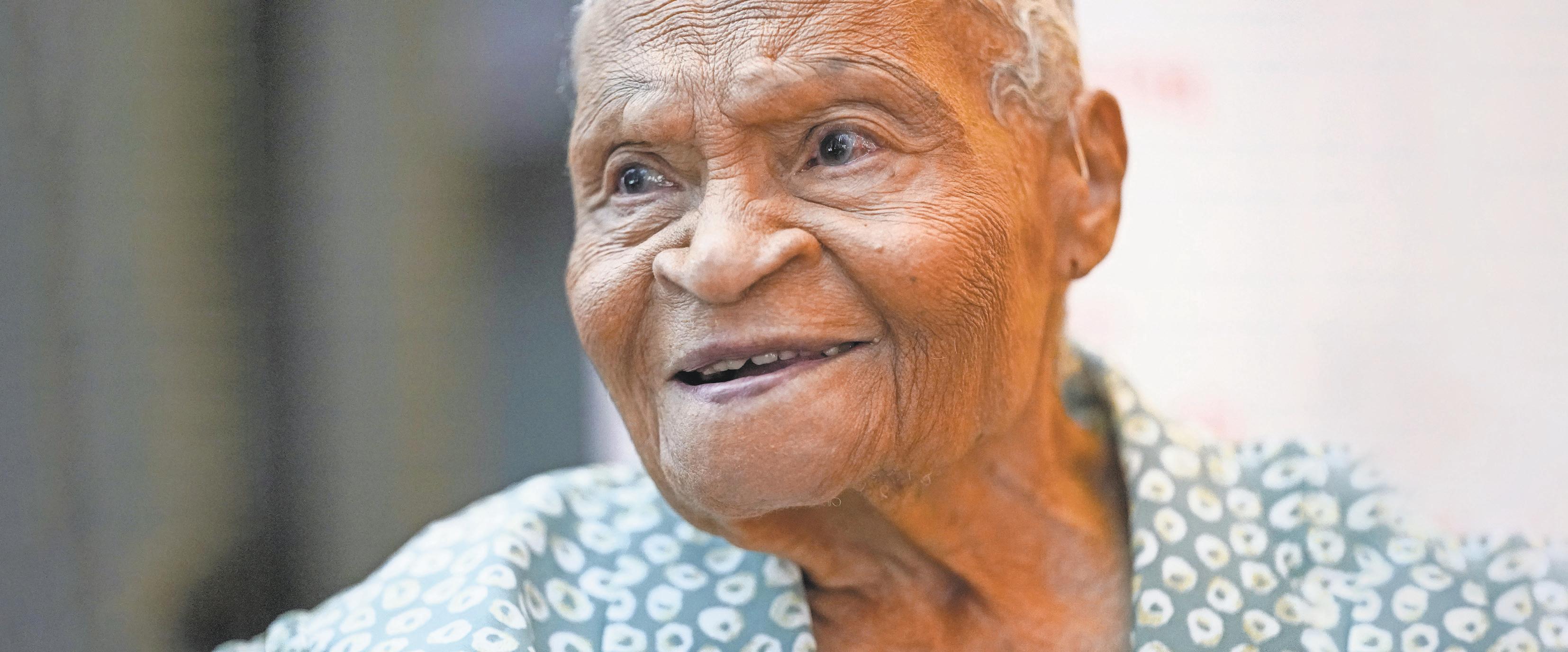


NOVEMBER 29, 2025 - DECEMBER 5, 2025

By
For more than a century, rest never came easily to Viola Ford Fletcher. When she closed her eyes, the horror of what she experienced in 1921 in the
Greenwood section of Tulsa haunted her dreams.
“When I sleep, it is never very deep or for very long because of the anxiety and the things I see,” she explained in “Don’t Let Them Bury My Story,” her 2023 memoir. “Imagine having the
same horrible nightmare every night for 100 years.”
On Nov. 24, “Mother Fletcher,” as she was called, the oldest living survivor of the Tulsa Race Massacre, died surrounded by family. She was 111. Her grandson, Ike Howard, told
By Eric Tucker
A federal judge on Nov. 24 dismissed the criminal cases against former FBI Director James Comey and New York Attorney General Letitia James, concluding that the prosecutor who brought the charges at President Donald Trump’s urging was illegally appointed by the Justice Department.
The rulings from U.S. District Judge Cameron McGowan Currie halt at least for now a pair of prosecutions that had targeted two of the
president’s most high-profile political opponents and amount to a stunning rebuke of the Trump administration’s legal maneuvering to install an inexperienced and loyalist prosecutor willing to file the cases.
The orders do not concern the substance of the allegations against Comey or James but instead deal with the unconventional manner in which the prosecutor, Lindsey Halligan, was named to her position as interim U.S. attorney for the Eastern District of Virginia. Defense lawyers said the Trump administration had no legal authority to make the appointment. In a pair of similar rulings, Currie agreed
and said the invalid appointment required the dismissal of the cases.
“All actions flowing from Ms. Halligan’s defective appointment,” including securing and signing the indictments, “were unlawful exercises of executive power and are hereby set aside,” she wrote.
The Justice Department did not immediately disclose its next steps, though it may appeal the rulings and could look to refile the cases.
“The facts of the indictments against Comey and James have not changed and this will not be the final word on the matter,” said White House spokeswoman Abigail Jackson.
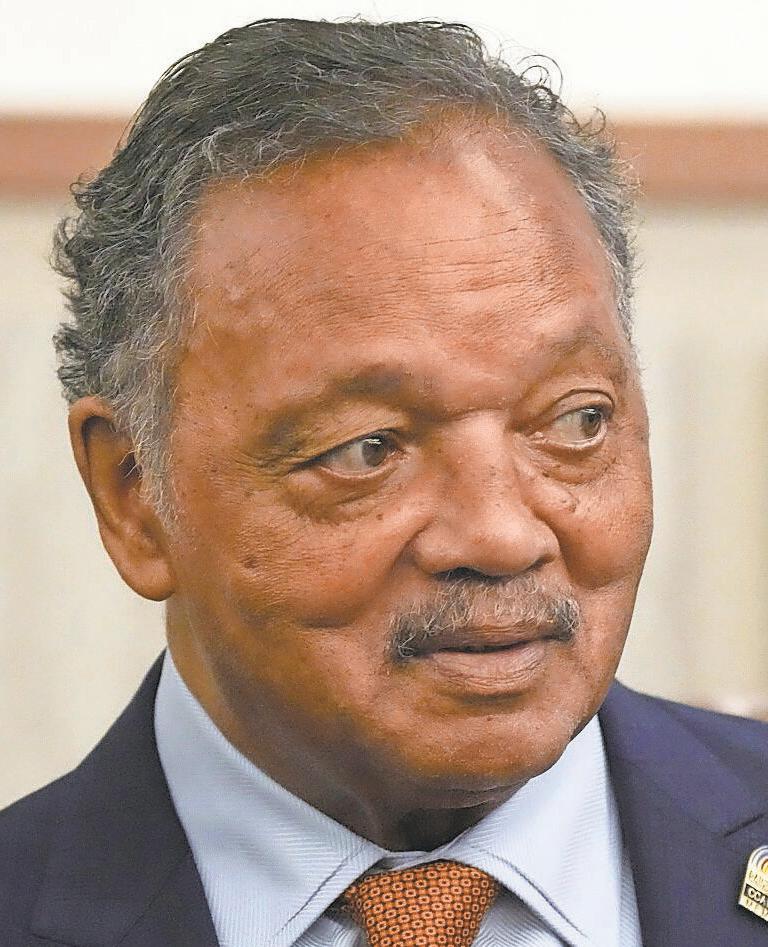

the hospital for observation related to progressive supranuclear palsy.
CNN that she left this world with “a beautiful smile” on her face. “She loved life, she loved people,” he said.
The child who watched Black Wall Street burn Fletcher was just 7 when 10,000
Indictments had been subject to multiple challenges
The challenges to Halligan’s appointment are just one facet of a multiprong assault on the indictments by Comey and James, whose multiple other efforts to dismiss the cases were still pending at the time of the Nov. 24 rulings. Both have separately asserted that the prosecutions were vindictive and emblematic of a weaponized Justice Department. Comey’s lawyers last week, in moving to get his case tossed out, seized on a judge’s findings of a constellation of grand jury
angry White Tulsans — armed with guns and biplanes, fueled by alcohol and envy, driven by talk that a Black man had accosted a White woman — descended on Greenwood, a thriving
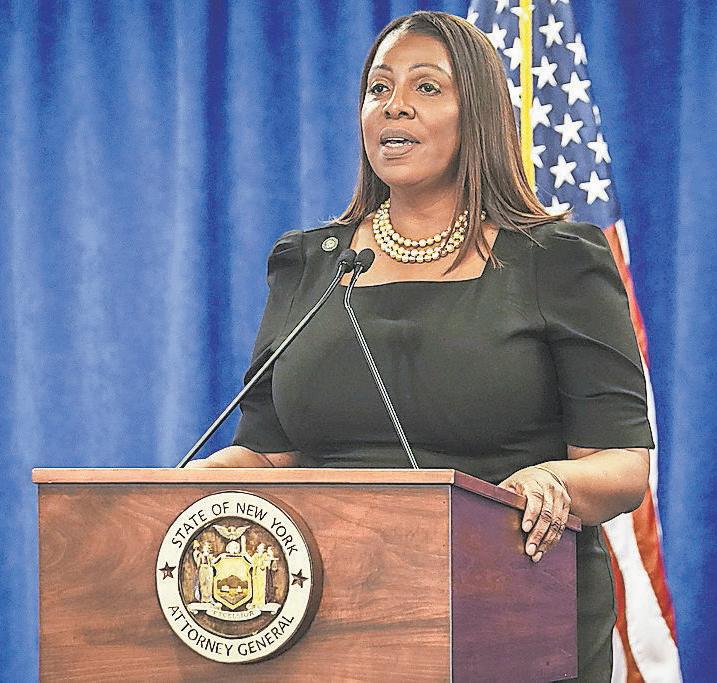
By Megan Sayles AFRO Staff Writer msayles@afro.com
After spending two weeks at Northwestern Memorial Hospital in Chicago, Rev. Jesse Jackson has been discharged, according to a Nov. 24 statement from his family. The civil rights icon was hospitalized on Nov. 12 for observation related to progressive supranuclear palsy (PSP), a rare neurological disorder affecting movement and balance, which he was diagnosed with in April.
Jackson, 84, remains in stable condition, his family said.
“Our family would like to thank
the countless friends and supporters who have reached out, visited and prayed for our father. We bear witness to the fact that prayer works and would also like to thank the professional, caring and amazing medical and security staff at Northwestern Memorial Hospital,” said Yusef Jackson, son of Jesse Jackson and spokesperson for the family, in a Nov. 24 statement. “We humbly ask for your continued prayers throughout this precious time.”
During his hospital stay, Jackson spent several days in the intensive care unit (ICU). On Nov. 16, his family clarified that he was not on life support and highlighted his call for 2,000 churches to provide
2,000 food baskets to help families facing malnutrition during the holiday season. Jackson, a mentee of Rev. Martin Luther King Jr., is known for creating Operation People United to Serve Humanity (PUSH), an organization dedicated to advancing economic justice for Black communities across the U.S, in 1971. He later launched the National Rainbow Coalition in 1984 to pursue equal rights for all Americans. In 1996, he merged the two organizations.
Jackson had lived with Parkinson’s disease since 2013 until his diagnosis was updated to PSP in April.

By AFRO Staff
The AFRO-American Newspapers (AFRO News), the nation’s longest-running Black-owned family newspaper, has launched a new community fundraising effort titled “133 Years. 133 Days. 133K Strong” to strengthen and expand its work as an independent voice for Black communities locally and nationwide.
The initiative invites readers, partners, churches, businesses and organizations to help the newspaper reach a $133,000 goal over 133 days. Suggested symbolic giving levels are $13, $33, $133, or $1,333, with a $5 minimum donation. Supporters may give online or by phone.
The campaign comes at a time when local newsrooms across the country are shrinking or closing, limiting the ability of communities to access reliable, culturally grounded reporting. AFRO leadership says this effort is designed to ensure that the newspaper remains
strong, community-centered and prepared to serve future generations.
“For 133 years, the AFRO has told the stories others overlooked—stories of strength, struggle, achievement, and everyday life,” said Dr. Frances “Toni” Draper, CEO and Publisher. “This campaign brings our community together to help secure the future of a trusted and independent Black news source. Every contribution, large or small, makes a difference.”
Funds raised through the campaign will support newsroom operations, training opportunities for young Black journalists, community reporting initiatives and continued investment in storytelling platforms that allow readers across all generations to access the AFRO’s coverage.
Readers who wish to support the campaign may donate at www.afro. com/donate or call 410-554-8200, Monday through Thursday, 9:00 a.m. to 5:00 p.m. Those giving by phone may request assistance from Miss Wanda, a 40-plus-year AFRO team member who is available to help donors complete their contributions.
The campaign will run throughout the 133-day period, with updates to be shared in future print and digital editions.
on the evening of May 31. By noon on June 1, when the Oklahoma National Guard reclaimed the streets, an

Your History • Your Community • Your News
The Afro-American Newspapers
Baltimore Office • Corporate Headquarters
233 E. Redwood Street 6th Floor, Suite 600G Baltimore, Maryland 21202
410-554-8200 • Fax: 410-554-8213 afro.com
Founded by John Henry Murphy Sr., August 13, 1892
Chairman of the Board/Publisher - Frances Murphy Draper
(Publisher Emeritus - John J. Oliver Jr.)
President - Benjamin Murphy Phillips IV
VP of Marketing and Technology - Kevin E. Peck
Director Digital Solutions - Dana Peck
Receptionist - Wanda Pearson - 410-554-8200, ext. 246
Director of Operations
Andrè Draper - 410-554-8200
Director of Finance
Bonnie Deanes - 410-554-8242
Executive Director/Director of Advertising
Lenora Howze - 410-554-8271 - lhowze@afro.com
Director of Community & Public Relations
Diane W. Hocker - 410-554-8243
Editorial
Managing Editor - Alexis Taylor - 410-554-8257
Editor - Dorothy Boulware - 410-554-8231
Special Projects
Editorial Assistant - Ama Brown-Parson
Archivist - Savannah Wood- 410-554-8277
Baltimore Circulation/Distribution Manager Andrè Draper - 410-554-8200
Creative Design and Content
Matthew McDonald
Washington Office 1140 3rd Street, N.E., 2nd Floor Washington, D.C. 20002-6723 202-332-0080 • Fax: 410-554-8213
(Washington Publisher Emerita - Frances L. Murphy II)
Director of Operations - Andrè Draper - 410-554-8200
Customer Service, Home Delivery and Subscriptions: 410-554-8200


estimated 300 men, women and children lay dead or dying, and 1,200 homes had been looted, destroyed or both.
A Justice Department report issued in January, just days before President Joe Biden left office, marked the first time the federal agency publicly acknowledged how the White mob “murdered hundreds of residents of Greenwood, burned their homes and churches, looted their belongings, and locked the survivors in internment camps.”
Nearly every Black family in Greenwood — about 10,000 people — was left homeless.
That the DOJ finally spoke the truth is due to Fletcher and other survivors who testified before Congress in May 2021, 100 years after the terror they endured.
“I will never forget the violence of the White mob when we left our home,” she told lawmakers. “I still see Black men being shot, Black bodies lying in the street. I still smell smoke and see fire. I still see Black businesses being burned. I still hear airplanes flying overhead. I hear the screams,” Fletcher testified.
“I have lived through the massacre every day. Our country may forget this history, but I cannot.”
The courage to tell the truth
Having told the truth that Tulsa — and America — attempted to bury, Fletcher sought justice. She and other survivors sued the city in 2020, seeking reparations for what they said was the complicity of local officials in the massacre.
Indeed, the Justice Department report found that “the massacre was the result not of uncontrolled mob violence, but of a coordinated, military-style attack on Greenwood” — a ruthless assault plotted in part by real estate speculators, businessmen, and elected city leaders. Their case went all the way to the Oklahoma Supreme Court, which upheld a lower court’s dismissal in 2024.
In June, Mayor Monroe Nichols IV announced that the city would attempt to raise $105 million by 2026 — the massacre’s 105th anniversary — to compensate the survivors’ descendants.
Viola Ford Fletcher entered this world in 1914, the daughter of sharecroppers, and died as one of the most important eyewitnesses to American history. The night of the massacre, she and her family fled in a horse and buggy — through gunfire.

“The neighborhood I fell asleep in that night was rich — not just in terms of wealth, but in culture, community, heritage. Within a few hours, all that was gone.”
She remembered seeing a White man shoot a Black man in the head, point-blank.
“The neighborhood I fell asleep in that night was rich — not just in terms of wealth, but in culture, community, heritage. Within a few hours, all that was gone,” she told Congress in 2021.
A legacy of survival and courage
With Fletcher’s death, just one living survivor remains: Lessie Evelyn Benningfield Randle, also 111, six months younger than Fletcher. When Fletcher fell ill, Randle sent word through her granddaughter: “She was sorry it was happening and that she loved her.”
As news of her death spread, tributes flooded social media.
“I will miss you, Mother Viola Fletcher. So triumphant. So gracious. So courageous. So present. Thank you,” Dr. Bernice King wrote on Threads. Fletcher witnessed what no child should, yet died knowing that no one was held accountable for the trauma she carried through a lifetime. She saw the election of the nation’s first Black president, Barack Obama, traveled to Ghana at age 107, and met Biden at the centennial observance of the massacre. But the justice she and her community deserved eluded her. Now, after 111 years, the nightmare that stalked her is over.
At long last, Viola Ford Fletcher can finally rest. This article was originally published by Word in Black.
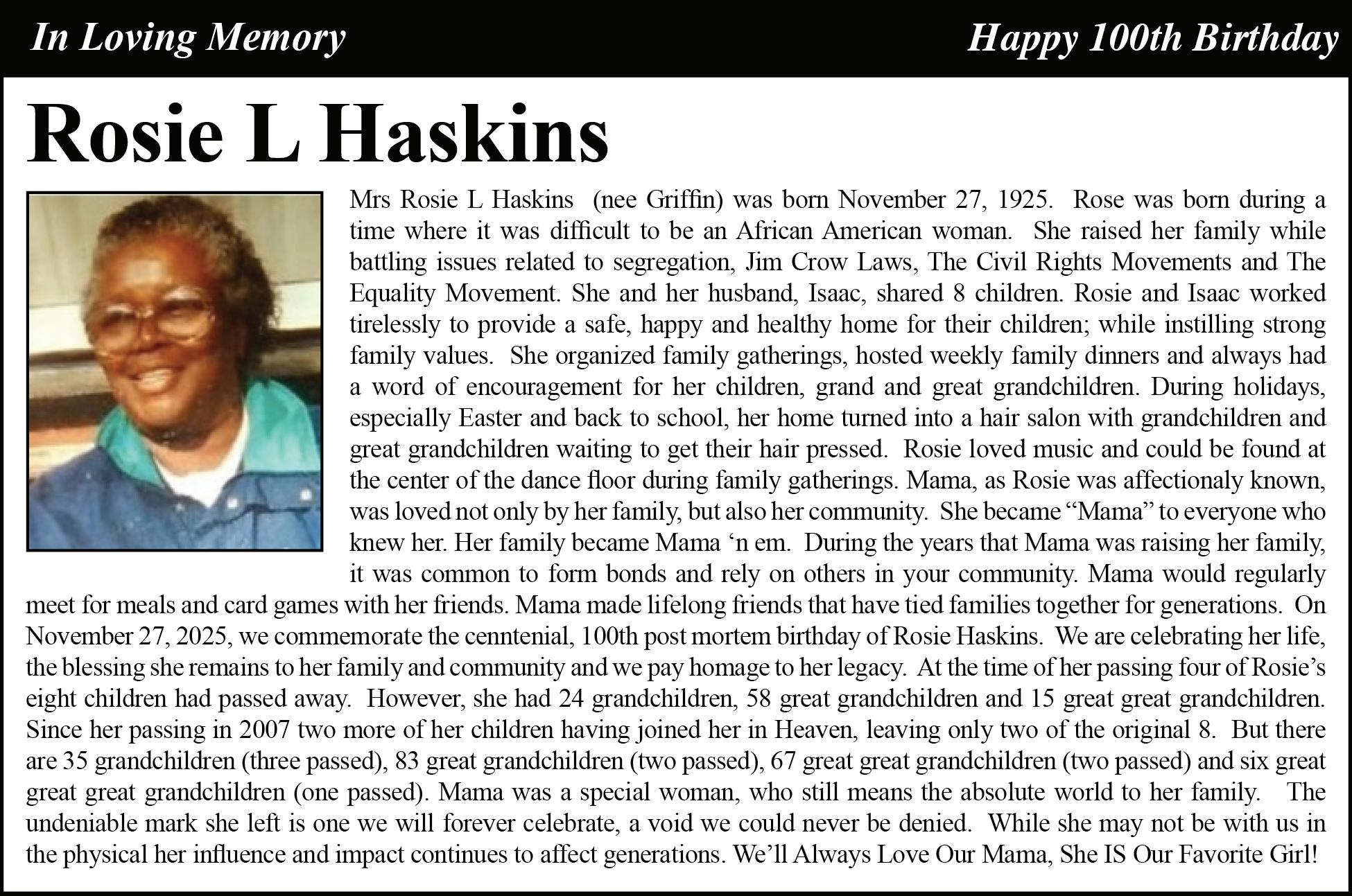
By Frances Murphy “Toni” Draper
On Nov. 14, 2025, aboard Air Force One, the president of the United States pointed at Bloomberg reporter Catherine Lucey and snapped, “Quiet. Quiet, piggy.” Why? She had the audacity to ask him a legitimate question about the Epstein files.
Days later, instead of apologizing, the White House defended him and implied that she somehow brought it on herself — that she was “inappropriate” and “unprofessional.”
So let’s be clear: Calling a woman “piggy” from the most powerful office in the world is abuse, not banter. Suggesting she brought it on herself is classic abuser logic. And when the “CEO of the free world” behaves this way in front of cameras, he is not just expressing a personal opinion — he is modeling a pattern.
Verbal abuse and violence:
What data actually shows Public health and domestic-violence research has been warning us for years:
• The CDC identifies hostility toward women and attitudes that justify aggression as key risk factors for intimate partner violence.
CDC materials and other IPV research note that abuse often begins with emotional and psychological attacks — name-calling, humiliation, and verbal degradation — which can escalate over time into physical violence.
Before the shove, there is the sneer.
Before the bruise, there is the insult.
Before the blow, there is the belittling.
And while October’s Domestic Violence Awareness Month has just passed, the deeper concern is not timing at all. It is the pattern. Rudeness is one thing; humiliation is another. What the president displayed is the same kind of demeaning, belittling
Continued from A1
irregularities and missteps by Halligan. James likewise has cited “outrageous government conduct” preceding her indictment.
“I am grateful that the court ended the case against me, which was a prosecution based on malevolence and incompetence and a reflection of what the Justice Department has become under Donald Trump, which is heartbreaking,” Comey, who has pleaded not guilty to charges of making a false statement and obstructing Congress, said in a video statement.
In a separate statement, James, a Democrat who has pleaded not guilty to mortgage fraud allegations, said, “I am heartened by today’s victory and grateful for the prayers and support I have received from around the country.” She said she remained “fearless in the face of these baseless charges as I continue fighting for New Yorkers every single day.”
Halligan’s appointment
At issue in Currie’s rulings is the mechanism the Trump administration employed to appoint Halligan, a former White House aide with no prior prosecutorial experience, to lead one of the Justice Department’s most elite and important offices.
Halligan was named as a replacement for Erik Siebert, a veteran prosecutor in the office and interim U.S. attorney who resigned in September amid Trump administration pressure to file charges against both Comey and James. He stepped aside after Trump told reporters he wanted Siebert “out.” Attorney General Pam Bondi swore in Halligan soon after.
The following night, Trump
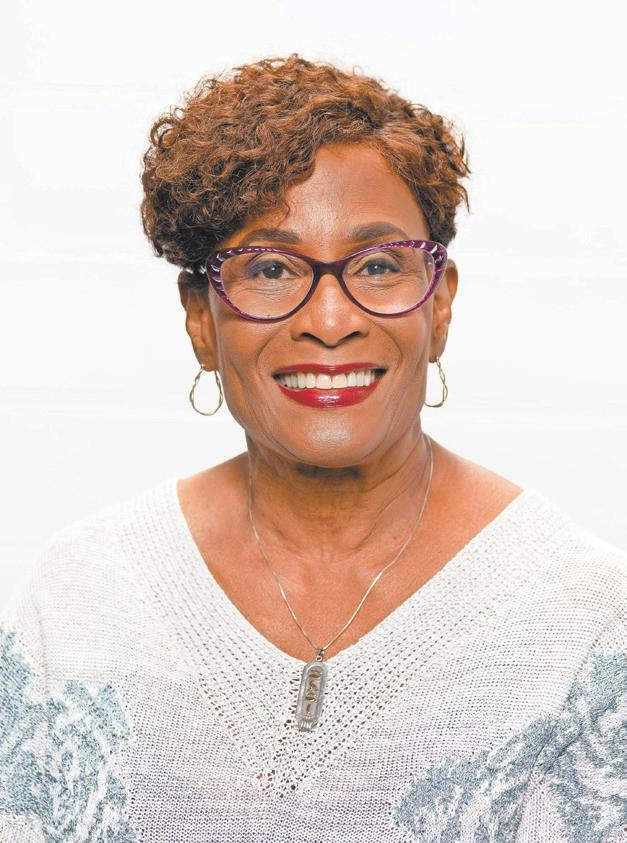
Courtesy photo
Dr. Frances Murphy “Toni” Draper serves as AFRO CEO and publisher. This week, she condemns the president’s public insult of a female reporter, arguing that such demeaning language mirrors patterns of emotional abuse, fuels misogyny and racism.
language that experts warn often mirrors the early stages of emotional abuse. The fact that this happened so soon after a national month of education and awareness only sharpens the contrast between what we claim to value and what we tolerate from our highest office.
We cannot claim to care about domestic violence and then shrug when the president publicly body-shames a woman and blames her for it.
This is also about racism and power
In this particular incident, the reporter appears to be White. But we cannot pretend this moment exists in a vacuum. The same president has a long, documented history of calling women pigs, including calling Miss Universe winner Alicia Machado “Miss Piggy” and referring to Rosie
said he would be nominating Halligan to the role of interim U.S. attorney and publicly implored Bondi to take action against his political opponents, saying in a Truth Social post that, “We can’t delay any longer, it’s killing our reputation and credibility” and “JUSTICE MUST BE SERVED, NOW!!!”
Comey was indicted three days after Halligan was sworn in, and James was charged two weeks after that.
Though attorneys general do have the authority to name an interim U.S. attorney who can serve for 120 days, lawyers for Comey and James argued that once that period expires, the law gives federal judges in the district the exclusive say of who gets to fill the vacancy. By making a successive interim U.S. appointment and bypassing the role of courts, defense lawyers said, the Justice Department did an end-run around well-established law. Currie agreed.
“The 120-day clock began running with Mr. Siebert’s appointment on January 21, 2025. When that clock expired on May 21, 2025, so too did the Attorney General’s appointment authority,” Currie wrote. “Consequently, I conclude that the Attorney General’s attempt to install Ms. Halligan as Interim U.S. Attorney for the Eastern District of Virginia was invalid and that Ms. Halligan has been unlawfully serving in that role since September 22, 2025.”
The Justice Department had defended Halligan’s appointment but revealed last month that it also had given Halligan a separate position of “Special Attorney,” presumably as a way to protect the indictment from collapse. But Currie said such a retroactive
O’Donnell as a “big, fat pig.”
And when you step back, a broader pattern comes into focus:
Women who challenge him are “nasty,” “fat,” or “no longer a 10.”
Women of color who challenge him are often hit with both sexist and racialized language.
Black feminist scholar Moya Bailey coined the term misogynoir to describe exactly this: the combination of anti-Black racism and misogyny directed at Black women.
International research on women journalists confirms that sexism, racism, and other forms of hate often blend together in attacks — especially against women of color.
Reports from the UN Human Rights Office, ICFJ, and academic studies show that:
Women journalists face disproportionately high levels of online and offline abuse.
• Women of color are targeted with a mix of gendered slurs and racist stereotypes.
• Those who are most visible and outspoken are more likely to face threats, harassment, and sometimes offline attacks.
So even when a specific slur isn’t explicitly racial, it sits inside a larger ecosystem of contempt for women and especially for women of color. That’s the water we’re swimming in.
When leaders talk like this, others follow
This isn’t just about one ugly moment. Social science research shows that when politicians use hateful or demeaning language, hate speech, and harassment increase among their supporters.Studies of leader behavior and online discourse find that:
• Exposure to derogatory language from elites normalizes prejudice and harassment.
Hate speech can spread through networks rapidly when it is modeled by
appointment could not save the cases.
“The implications of a contrary conclusion are extraordinary,” the judge wrote. “It would mean the Government could send any private citizen off the street — attorney or not — into the grand jury room to secure an indictment so long as the Attorney General gives her approval after the fact. That cannot be the law.”
Though the defendants had asked for the cases to be dismissed with prejudice, meaning the Justice Department would be barred from bringing them again, Currie instead dismissed them without prejudice.
Comey was indicted just days before the statute of limitations in his case expired, which could complicate any effort to refile the case. One of his lawyers, Patrick Fitzgerald, said in a statement that Currie’s decision “further indicates that because the indictment is void, the statute of limitations has run and there can be no further indictment.”
Judges have separately held that several other interim U.S. attorneys — in New Jersey, Los Angeles and Nevada — have served in their positions unlawfully but have permitted cases brought by their offices to proceed. But lawyers for Comey and James had argued that Currie’s ruling needed to go even further because Halligan was apparently the only prosecutor who presented evidence to the grand juries.
Comey has for years been one of Trump’s chief antagonists. Appointed FBI director in 2013 by President Barack Obama, Comey at the time of Trump’s 2016 election was overseeing an investigation into whether the Republican’s presidential campaign had conspired with Russia to sway the
those in power.
In other words, when the president calls a woman “piggy,” it doesn’t stay on the plane. It travels — into homes, social media feeds, school hallways, locker rooms, and workplaces.
If the president can talk this way unchallenged, what stops:
The supervisor who already resents women on his team?
The boyfriend who already uses words as weapons?
The teenage boy online who thinks humiliation is just “content?”
editors, and community leaders say nothing, their silence sounds like approval. Journalists who fail to speak up when one of their own is demeaned help normalize the abuse of the press. Political leaders who look the other way help normalize the abuse of women.
• Communities that shrug and say “that’s just how he talks” help normalize the abuse of power itself.
”Calling a woman ‘piggy’ from the most powerful office in the world is abuse, not banter.”
What are we teaching our children?
Body-shaming is not politics. It is emotional violence.
Teen girls are already navigating brutal pressures — filters, “perfect” bodies on Instagram, bullying in group chats. When they see the president call a woman “piggy” for doing her job, what are we teaching them?
That your worth is in your waistline.
That your dignity is disposable if a powerful man decides to entertain himself.
That if a man in authority abuses you, people will say you brought it on yourself.
And what are we teaching our sons if we let this slide?
That real men dominate and degrade.
That power means never having to apologize.
That empathy is weakness.
Silence is not neutral. It’s permission.
This is the part that should haunt us:
When pastors, principals, CEOs,
outcome of the race. Furious over that investigation, Trump fired Comey in May 2017. James has also been a frequent target of Trump’s ire, especially since winning a staggering judgment against him and the Trump Organization in a lawsuit
• We cannot tell women to report harassment and domestic violence out of one side of our mouths, while we excuse identical patterns of behavior from the most powerful man in the world out of the other.
What we must do now
This is the moment for all of us — parents, grandparents, teachers, pastors, coaches, mentors, journalists — to:
• Name this behavior for what it is: abusive, demeaning and dangerous. Teach our children explicitly that mocking someone’s body or humanity is never acceptable, no matter who does it. Model a different kind of strength— one rooted in respect, self-control, and courage, not cruelty.
• Speak up, publicly and privately, when leaders cross these lines. Not just when it’s politically convenient, but when it’s morally necessary. Because if the president can call a woman “piggy” and blame her for it, and the country shrugs, then the problem is bigger than one man. We owe women better. We owe our children better. We owe our democracy better.
alleging he defrauded banks by overstating the value of his real estate holdings on financial statements. An appeals court overturned the fine, which had ballooned to more than $500 million with interest, but upheld a lower court’s finding that Trump had committed fraud. This article was originally published by The Associated Press (AP). AP writers Michael R. Sisak in New York and Lindsay Whitehurst and Alanna Durkin Richer in Washington contributed to this report.
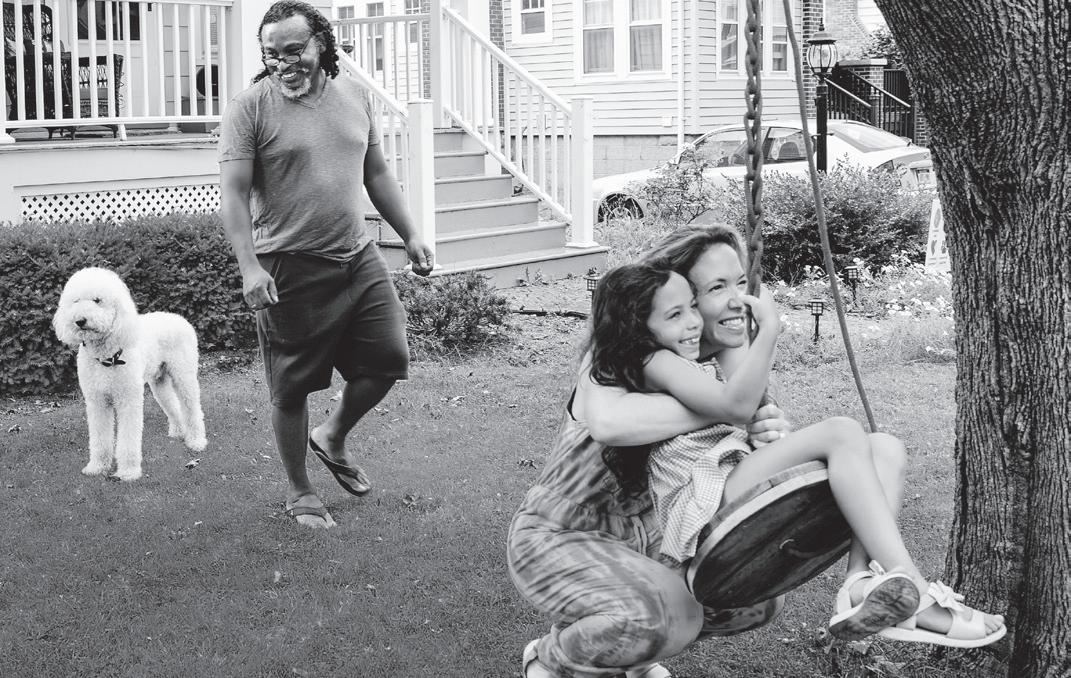


















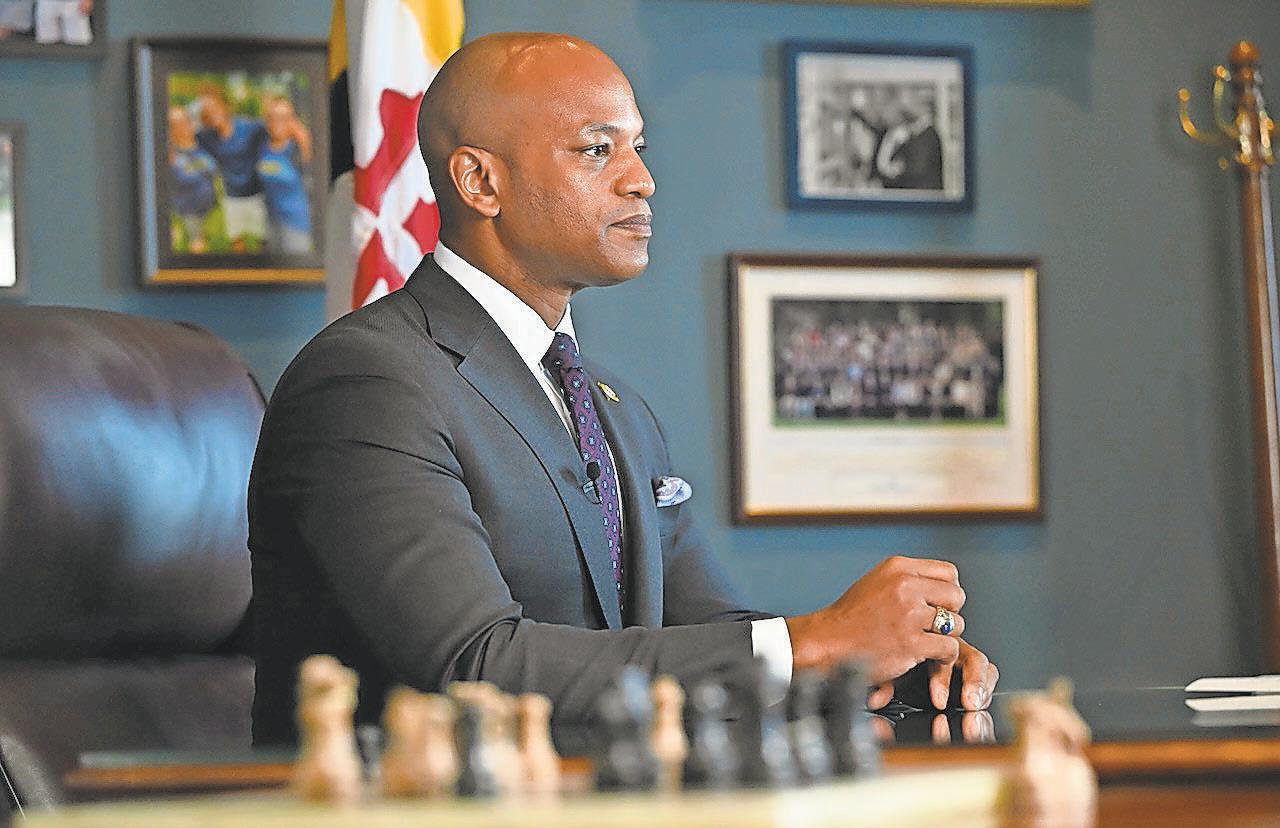
By Megan Sayles AFRO Staff Writer msayles@afro.com
Since Gov. Wes Moore announced that he would officially be considering mid-decade redistricting on Nov. 4, Marylanders have started to weigh in— with some fully in support of drawing new maps and others firmly opposed. The push comes amid a growing national race for mid-cycle redistricting, which started this summer after the 47th president urged Texas to redraw its maps to secure more Republican congressional seats.
Currently, House Republicans have a slim five-seat majority over Democrats— raising the stakes for potential changes in congressional representation.
On Nov. 18, the Governor’s Redistricting Advisory Commission (GRAC) held its third meeting, giving Marylanders a chance to comment on the possibility of a new map.
“We’ve all seen what the president has been calling for—for other states to
change their redistricting— and I think Maryland should do the same in order to combat that,” said Rion Dennis, a Montgomery county resident, during the meeting.
“We have heard a lot about Maryland voters being disenfranchised. I think the entire state will be disenfranchised if the Republicans continue their lawlessness at the federal level.”
When Moore announced the creation of the Governor’s Redistricting Advisory Commission, he positioned the process as one rooted in fairness and inclusivity for all Marylanders, regardless of their party affiliation.
“My commitment has been clear from day one— we will explore every avenue possible to make sure Maryland has fair and representative maps,” said Moore in a Nov. 4 press release. “This commission will ensure the people are heard. I thank those who have raised their hands to lead this process, and I am confident in their ability to gather the views and perspectives of a broad range of voices throughout the state.”
Moore tapped U.S. Sen. Angela Alsobrooks (D-Md.) to chair the commission, which includes Senate President Bill Ferguson (D-District 46), former Attorney General Brian Frosh, Cumberland Mayor Ray Morriss and Delegate C.T. Wilson (D-District 28). Notably, Morriss is the only nonpartisan member, and there are no Republican appointees.
Some Marylanders view mid-decade redistricting as a move that could further diminish political influence of the state’s Republicans. In 2024, 23.9 percent of eligible active voters in the state were registered Republican while 52.6 percent were registered Democrat, according to the Maryland State Board of Elections.
For many Republicans, a new map would only be considered fair if it expanded their representation in Congress.
“I would welcome a genuinely fair redistricting process, one that would restore at least two, if not three, Republican congressional districts in Maryland,” said Nicole Beus Harris, chairwoman of the Maryland Republican Party, in a Nov.
4 statement. “Anything less than that will be hyper-partisan and hypocritical by Governor Moore and the rigged ‘bi-partisan’ commission.”
Some Democratic leaders have also warned that pursuing mid-decade redistricting could backfire, potentially creating legal complications and diverting attention from more immediate challenges facing the state—like its $1.5 billion budget deficit.
In a Nov. 4 statement, Ferguson echoed those reservations.
“The Senate Democratic Caucus understands that this is an unbalanced risk-reward calculation,” said Ferguson. “It is why there is overwhelming concern about Maryland joining the mid-cycle redistricting wars rather than focusing on tangible, immediate policies to protect our state from this lawless Trump administration.”
The next public comment session for the Governor’s Redistricting Advisory Commission will take place on Dec. 5 via Zoom. Written testimony, including suggestions for new maps, can be submitted to GRAC@ maryland.gov.
By Brandon Henry AFRO Intern
The National Transportation Safety Board (NTSB) reported Nov. 18 that a single loose wire is believed to be the cause of the marine accident that led to the collapse of the Francis Scott Key Bridge and the death of six highway employees on March 26, 2024.
During a public meeting at the agency’s headquarters, NTSB officials shared the results of their investigation into the disastrous crash of the Dali, a 984-foot-long container ship. It has been determined that a breaker randomly opened as the result of a loose wire located in the ship’s electrical system, which eventually caused two vessel blackouts that cut propulsion and prevented operators from steering the ship.


By Brandon Henry AFRO Intern
On Nov. 22, Anne Arundel County officials hosted “A Day of Acknowledgement: Confronting the Legacy of Slavery,” where they released an official apology for the roles past leaders in the area played during chattel slavery.
The event and the apology were a result of various organizations’ requests, including; the National Association for the Advancement of Colored People (NAACP), the Caucus of African American Leaders, and the Anne Arundel County Human Rights Commission.
Information released by Anne Arundel County officials said the event was held to “face hard truths, honor those affected, and take steps toward equity and repair.”
“It is long overdue for Anne Arundel County to acknowledge and apologize for its role in supporting and enforcing the institution of slavery,” said Steuart Pittman, county executive, in a statement about the event. “As a direct descendant of local enslavers, I understand that there is no
way to undo the past, but I cannot end my time in office without responding to this request with an acknowledgment and apology. Our Office of Equity and Human Rights has worked closely with local historians and descendants of enslaved people to ensure this apology is a meaningful step toward repair.”
Records from the Maryland State Archives, a partner for the event, show that the first enslaved Black people arrived in Maryland in 1634. For centuries, Black people were held against their will, building up a nation that denied their humanity then and still profits off of their hard labor today.
The Day of Acknowledgement included two panels, titled “A Conversation About Reparations” and “Opportunities Now!” These sessions addressed reparations and programs that can provide opportunity to people within the community. There were also two exhibits during the lunch period of the event, including a viewing of the Maryland Emancipation Quilt and “Flee! Stories of Flight from Maryland.”

By Andrea Stevens AFRO Staff Writer
On Jan. 1, 2026, Will Holmes, founder of Will Holmes Consulting (WHC), will celebrate 20 years of success as an entrepreneur in the world of consulting and leadership. Holmes says the milestone reminds him of the purpose that drove him to leave corporate America and start the firm in 2006.
“I really wanted to be more free to create solutions and make more of an impact with different companies,” Holmes says. “At first, I didn’t really understand how to get capital, but once I figured it out, I started telling everybody else how to do it so they could grow faster.” Holmes says the company’s roots trace back to free Wednesday night training sessions he used to host in a Baltimore restaurant. Those early conversations formed the foundation of a curriculum for more than 700 students in more than a dozen counties across Maryland.
As WHC expands, Holmes reflects on what 20 years in business means to him. He calls his son his driving force and his true legacy.
“Staying open through recessions has been hard. We have won awards from governors and mayors but being a good father is what I am most proud of,” he says. “I wanted to create a life that was stable and supportive so my son could focus on school
Continued from B1
There were eight people on the bridge at the time of the incident: an inspector and a crew of seven road maintenance workers. Six of these people died as a result of the collapse, and the death count would’ve been higher if workers had not stopped motorists

and prepare for his future.”
WHC has won over 15 awards in the past two decades, Holmes points to the 2024 SBA Maryland Business of the Year award as a highlight. “I wanted that award for a long time. To win it we had to make a huge impact on the economy in Maryland and we did that,” he says. “It is a testament to my team and our commitment to creating jobs and helping entrepreneurs grow.”
Cheri Henry is owner of RK Exclusive Catering and a graduate of WHC’s Park Heights program. She said the anniversary reflects the
from driving on the bridge.
“Our investigators routinely accomplish the impossible, and this investigation is no different,” said Jennifer Homendy, NTSB chairwoman in a statement. “The Dali, at almost 1,000 feet, is as long as the Eiffel Tower is high, with miles of wiring and thousands of electrical connections. Finding this single wire was like hunting for a loose
impact the organization has on individual business owners.
“Will Holmes and his team provided expert guidance and mentorship that builds real confidence,” she says. “I graduated from another program still not knowing how to do a profit and loss statement or complete a full business plan, but from the moment I met Will, he’s been mentoring me.”
Henry now describes her company as stronger and more strategic. She expresses gratitude for Holmes commitment to help entrepreneurs.
“The WHC program helped
rivet on the Eiffel Tower.”
“Like all of the accidents we investigate, this was preventable,” said Homendy. “Implementing NTSB recommendations in this investigation will prevent similar tragedies in the future.”
A key part of the Key Bridge collapse and the ensuing deaths can be attributed to the bridge being prone to collapse due to hits by ships
me move from vision to execution with clarity and accountability,” she says. “I am deeply, deeply grateful to Will Holmes for his commitment to helping entrepreneurs like me build sustainable success.”
Looking ahead Holmes says he plans to expand the curriculum into more states and deepen the firm’s technology work, including an AI phone system designed for businesses.
“My mom used to say, you’re here to work and serve, and when your work is done, you go home,” he said. “I’m not ready to go home yet. I want to keep working.”
or vessels, an issue that has only been raised since its 1977 opening, officials said. In 1980, Blue Nagoya, a container ship from Japan, made contact with the Key Bridge after it lost its thrust. The Blue Nagoya was 390-feet-long and didn’t cause major damage to the bridge. In comparison to the Blue Nagoya, the Dali is 10 times bigger.
By Chianti Marks AFRO Intern
The Baltimore Museum Of Art (BMA) recently opened the “Amy Sherald: American Sublime” exhibition and honored the artist with the 2025 Artist Who Inspires award. The exhibit, which will be on display until April 5, 2026, highlights the evolution of Sherald, an artist who has made a name for herself as she moves forward in revolutionizing the world of portraiture.
The exhibition features about 40 paintings, illuminating her artistic development from 2007 to 2024 in a stunning mid-career survey. Many works feature Baltimore-based models and were painted in the city, reflecting her deep ties to the community as a graduate of the Maryland Institute College of

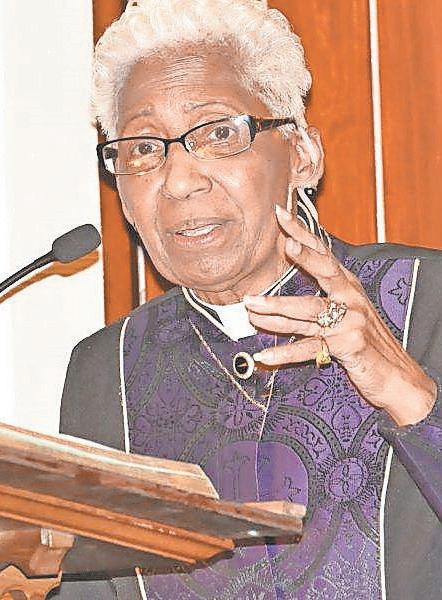
By Chianti Marks AFRO Intern
Bishop Violet L. Fisher, a trailblazing former bishop in the United Methodist Church who served as an inspiration to many generations of pastors and civilians, died Nov. 17 at the age of 86.
In 2000, Fisher was elected to the episcopacy, becoming the first African-American woman appointed as bishop to the denomination’s Northeastern Jurisdiction, which included the Western and Central New York conferences. She retired in 2008.
“Bishop Violet Fisher was a pioneer whose ministry broke barriers and built bridges. Her unwavering faith, prophetic voice, and deep compassion left an indelible mark on our church and on all who were blessed to walk alongside her. We give thanks for her life and legacy,” said Council of Bishops President Bishop Tracy S. Malone, the first African-American woman to hold that position in The United Methodist Church, in a statement.
Fisher was born Aug. 28, 1939, in Easton, Md. She was raised in a Methodist background and began her career in education. She taught for 22 years in Maryland and Virginia public schools, after obtaining a bachelor’s degree from Bowie State University and a master’s from George Washington University. Her call to ministry came at the age of 16, at a time when women had little access to ordained ministry, particularly in the Delaware Conference of the Central Jurisdiction.
Fisher was a national evangelist and a temporary missionary to East Africa, Haiti and Jamaica after being ordained by the King’s Apostle Holiness Church of God at the age of 25.
In 1988, Bishop Fisher returned to the United Methodist Church and graduated with a master’s of divinity from Eastern Baptist Seminary in Philadelphia. Bishop F. Herbert Skeete designated her as a deacon that same year, and Bishop Susan M. Morrison named her an elder in 1990.
Fisher’s pastoral assignments included: associate pastor at St. Daniel’s United Methodist Church in
Chester, Pa.; senior pastor at Sayer’s Memorial United Methodist Church in Philadelphia; and district superintendent of the Eastern Pennsylvania Conference, where she also served as dean of the cabinet (1998–1999).
In addition to representing the church at the World Methodist Council in Rio de Janeiro in 1996, she led her delegation to the General and Northeastern Jurisdictional Conferences in 1996 and 2000. She supported the work of the General Board of Church and Society, the General Board of Discipleship and Older Adult Ministries while serving as dean of the NEJ School of Evangelism from 1998 to 1999. From 1997 onward, she became a member of the Eastern Baptist Seminary Board of Directors.
“When Bishop Fisher was elected, she did not just make history—she made space. Space for women, for Black clergy, and for all those who had been told they did not belong. Her courage and grace continue to inspire us to lead with boldness and humility,” said NEJ College of Bishops President Bishop Cynthia Moore-Koikoi.
Bishop LaTrelle Miller Easterling, the first Black woman to hold the position of president of the NEJ College of Bishops and resident bishop of the Baltimore-Washington/Peninsula-Delaware Episcopal Area, also praised Bishop Fisher’s legacy.
“Bishop Violet Fisher opened doors that many of us now walk through,” Easterling said. “Her election was not only a personal triumph but a communal victory for justice, equity, and the full inclusion of women of color in the life of the church. I stand on her shoulders with deep gratitude.”
Bishop Fisher is survived by her son, Marcus.
Homegoing services for Bishop Fisher will include a viewing from 6-8 p.m. on Dec. 12; and a final viewing and funeral beginning at 10 a.m. and 11 a.m., respectively, on Dec. 13. Both the viewing and funeral service will be hosted by St.
United Methodist Church, located at 100 Peachblossom Road, Easton, Md.

Art’s Hoffberger School of Painting.
For more than a decade, Sherald has used a grayscale palette to depict skin tones as a radical tool for redirection—one that draws attention to her subjects’ interior lives and the narratives within each portrait.
“American Sublime is a salve. It’s a call to remember our shared humanity and an insistence on being seen,” said Sherald, in the BMA exhibit overview.
Sherald made history in 2016 as the first African American to win the grand prize in the National Portrait Gallery’s Outwin Boochever Portrait Competition for her painting, “Miss Everything (Unsuppressed Deliverance).” She was commissioned to paint the official portrait of former first lady Michelle Obama for the National Portrait Gallery as a result of that recognition.
The BMA obtained her painting, “Planes, Rockets, and the Spaces in Between” in 2018 and has maintained a close relationship with the artist. Now, Sherald’s offerings are available in the city that shaped her as an artist.
“Baltimore has always been part of my DNA as an artist. Every brushstroke carries a little of its history, its energy, its people and my time there. To bring this exhibition here is to return that love,” said Sherald, in materials sent to members of the media.
In addition to the exhibit, visitors can also view the Art21 “Everyday Icons” episode which focuses on Sherald and her work.
“I really have this deep belief that images can change the world,” says Sherald, in the video. “It’s not that I started making work with that belief, but it’s what I’ve come to know. It’s a beautiful way to tell a story.”
In the video, Sherald discusses the concept behind her official portrait of former First Lady Michelle Obama.
“I wanted to paint a quiet and powerful portrait of her that offered the viewer a different kind of moment and make it genuinely about her rather than the title of ‘First Lady,’” Sherald explains.
As visitors move through the exhibition—from its layout to the descriptions of her different styles and processes—Sherald’s art, concepts and techniques reveal stories

layered deep within each painting. The exhibition offers a rich and immersive experience for the public. Sherald’s work proudly, quietly and yet powerfully celebrates Black leaders, every day people living every day lives and even the Black martyrs who have shaped the
world. Through her artistry, she invites viewers to see more than what meets the eye—to find humanity, stillness, and meaning in each gaze.
Admission to “Amy Sherald: American Sublime” is free on Thursday evenings and all day Thursday, Jan.

15, and Thursday, Feb. 19.
Tickets are required at other times: $18 for adults, $16 for active-duty U.S. military members and their families with valid ID, $16 for seniors 65 and older, $10 for students with valid ID, and free for children and teens 17 and under.
“Baltimore has always been part of my DNA as an artist. Every brushstroke carries a little of its history, its energy, its people and my time there.
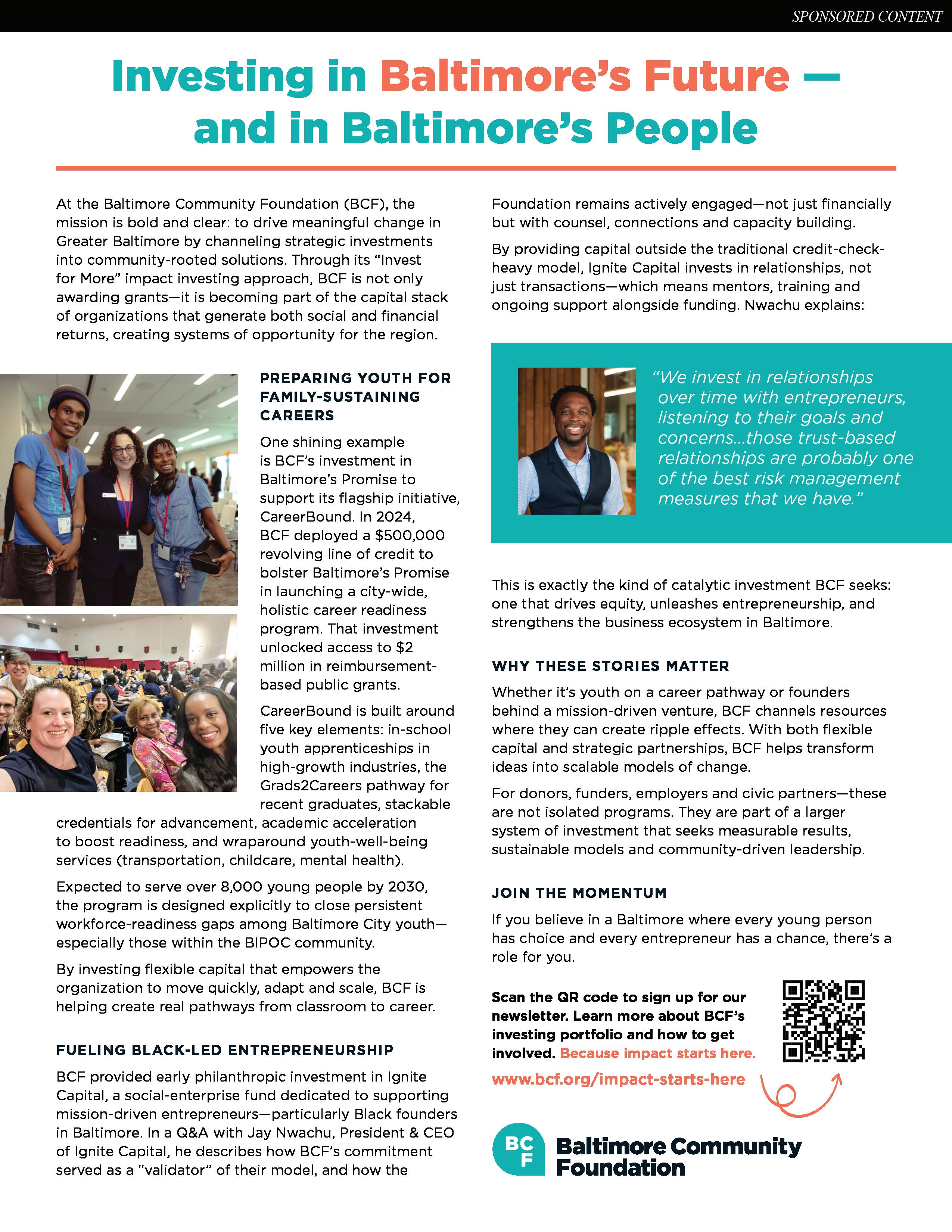

By AFRO Staff
On Nov. 22 the Kappa Silhouettes held their annual toy drive. For more than a decade the Silhouettes have been a driving force behind the Christmas cheer experienced by families across Baltimore City. With 144 toys donated by those in attendance. From dolls to art sets and learning games and small keyboards, recipients are sure
to enjoy the offerings from this year’s volunteers.
All gifts collected will go towards Afro Charities’ Mrs. Santa Toy Giveaway. Members of the Afro Charities team will hold the Mrs. Santa program at Furman L. Templeton Elementary School, located at 1200 Pennsylvania Ave., on Saturday, Dec. 13, from 12 p.m.- 3 p.m.
AFRO Photos/ Nyame-Kye Kondo
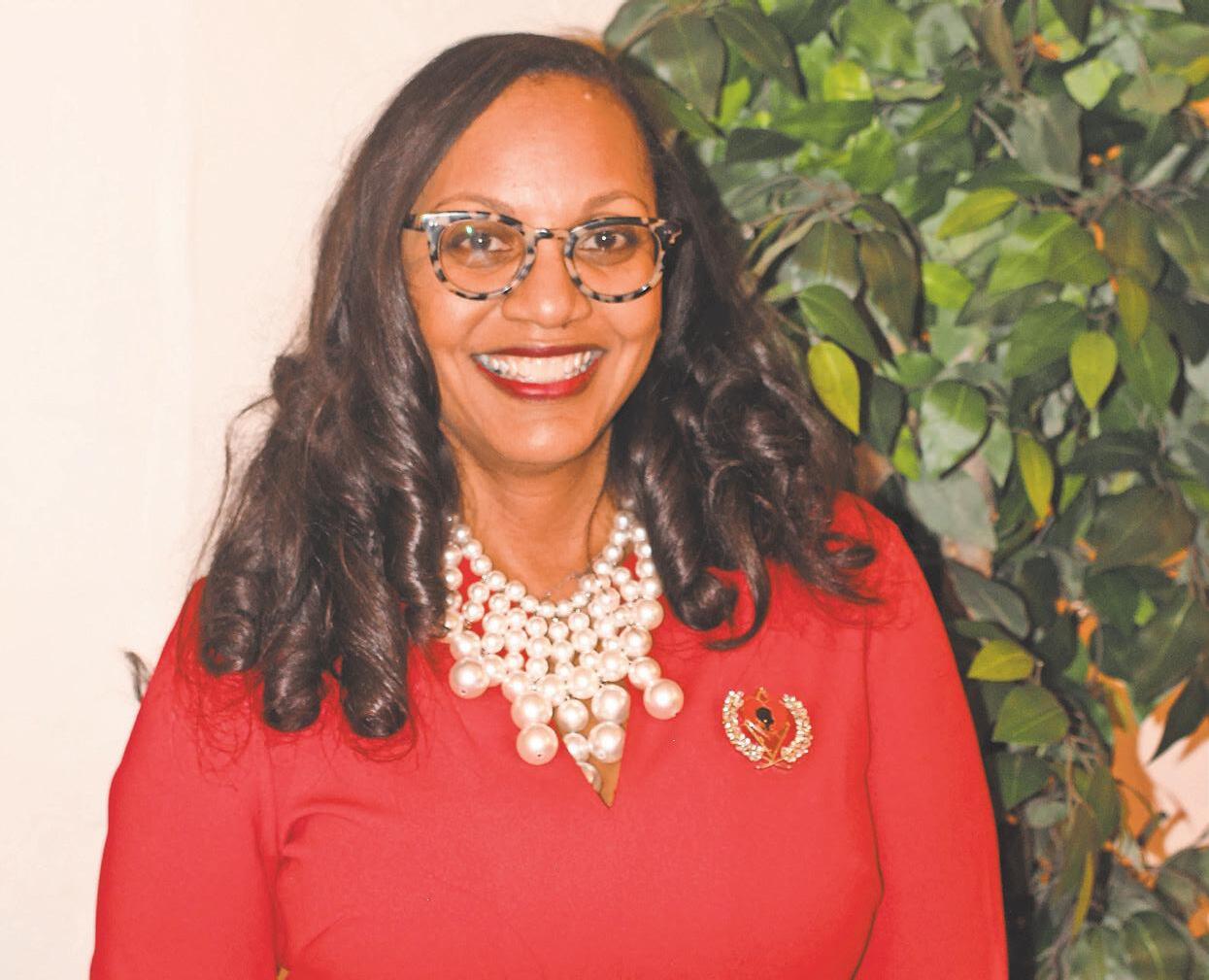
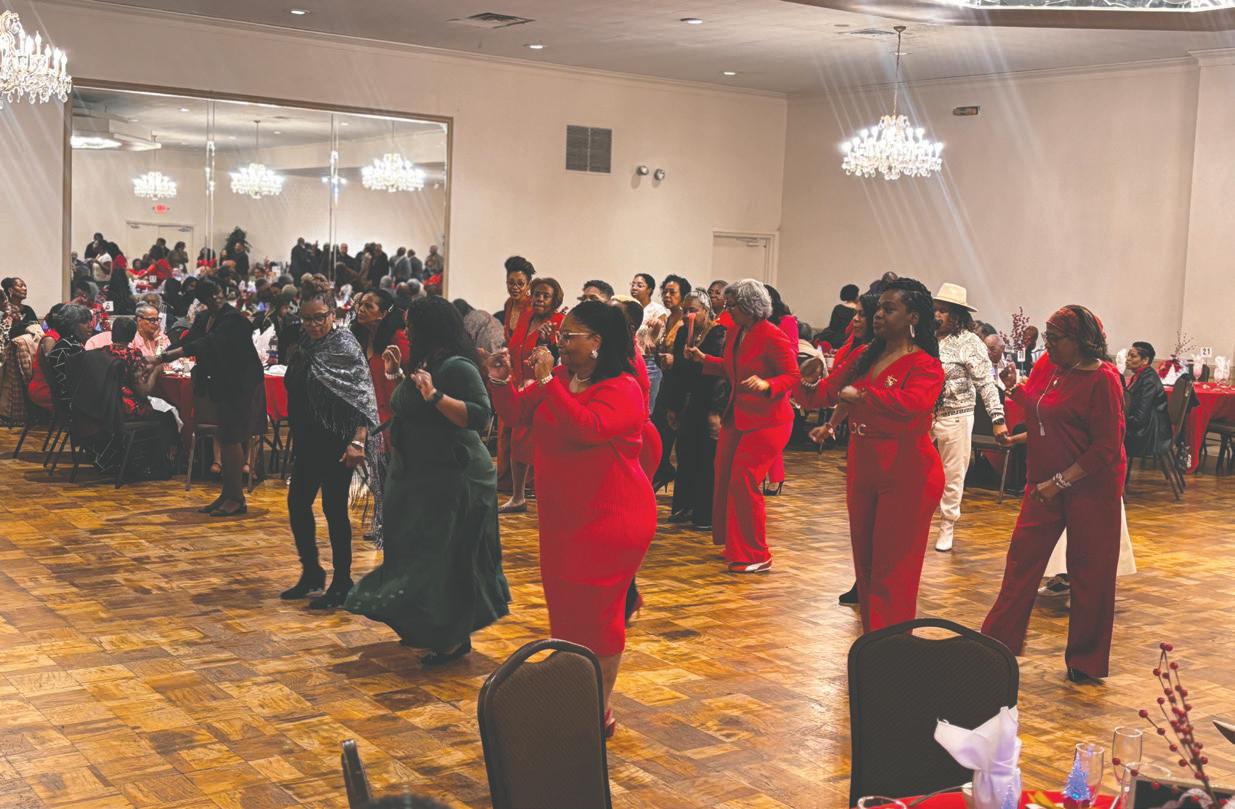

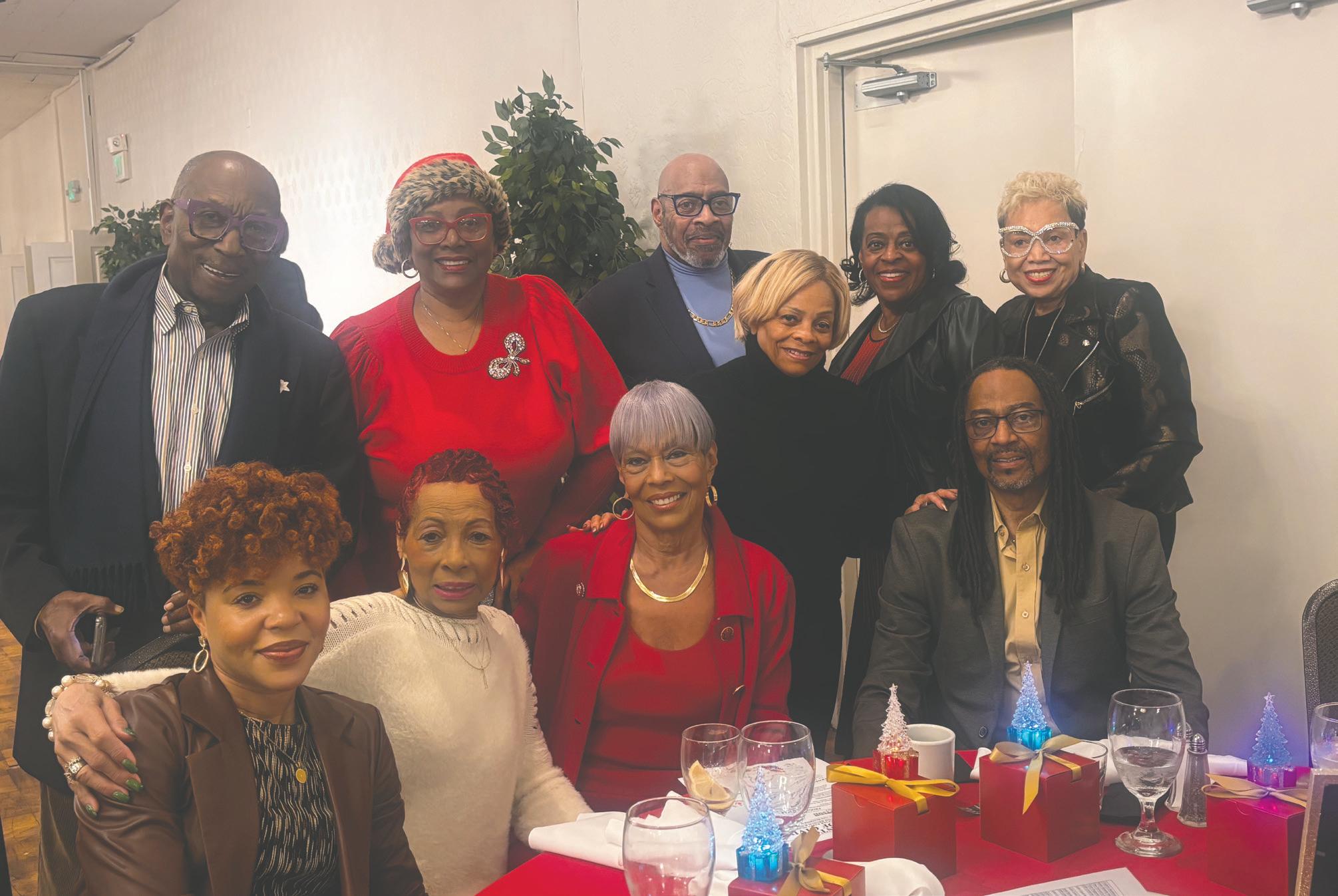
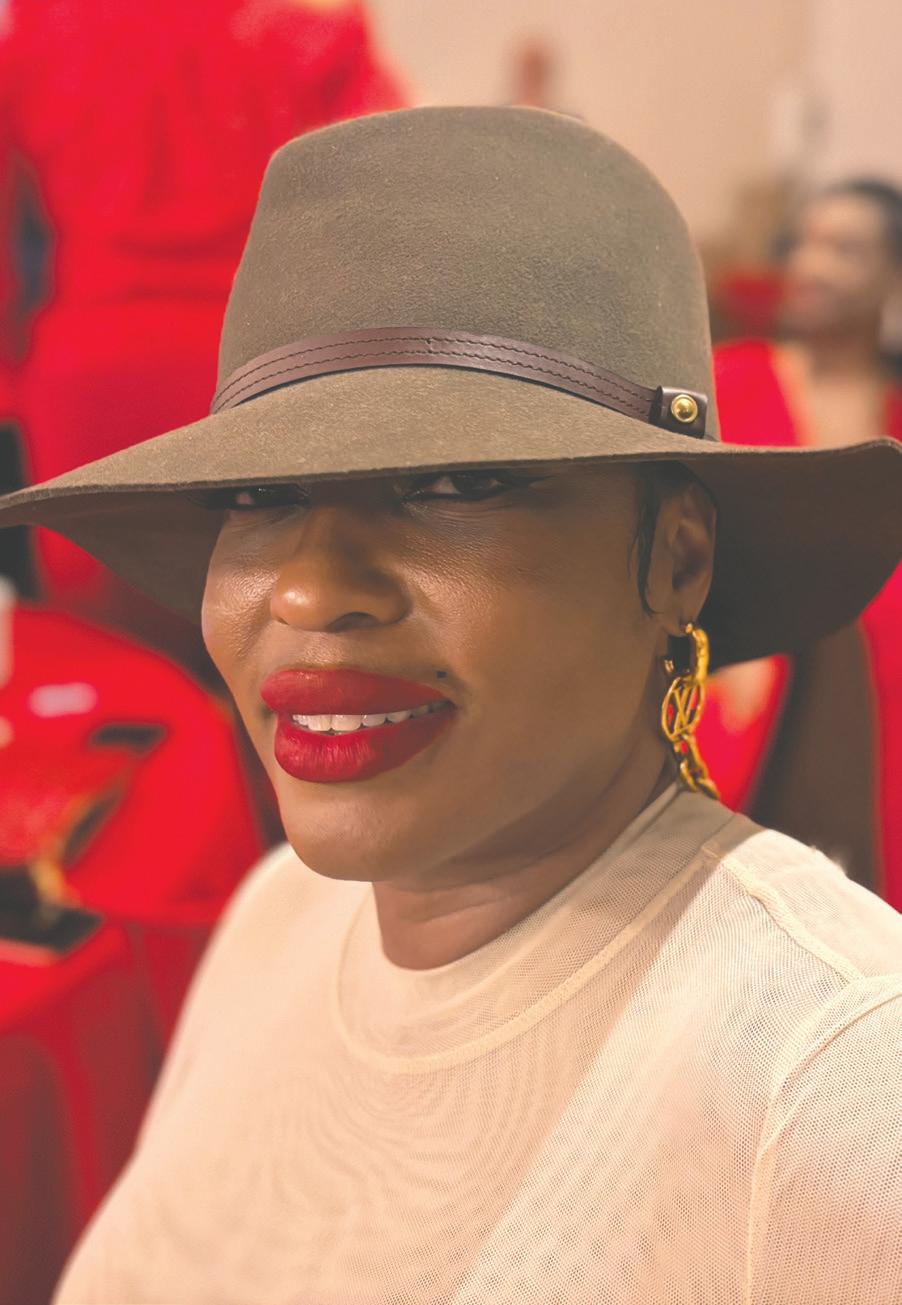
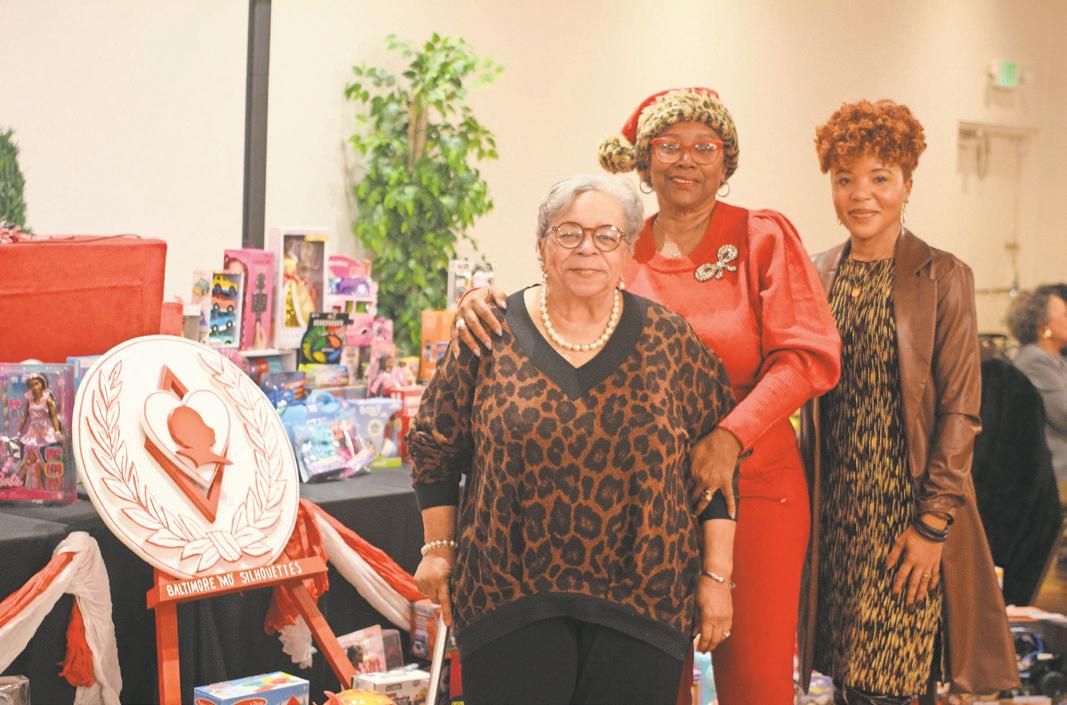
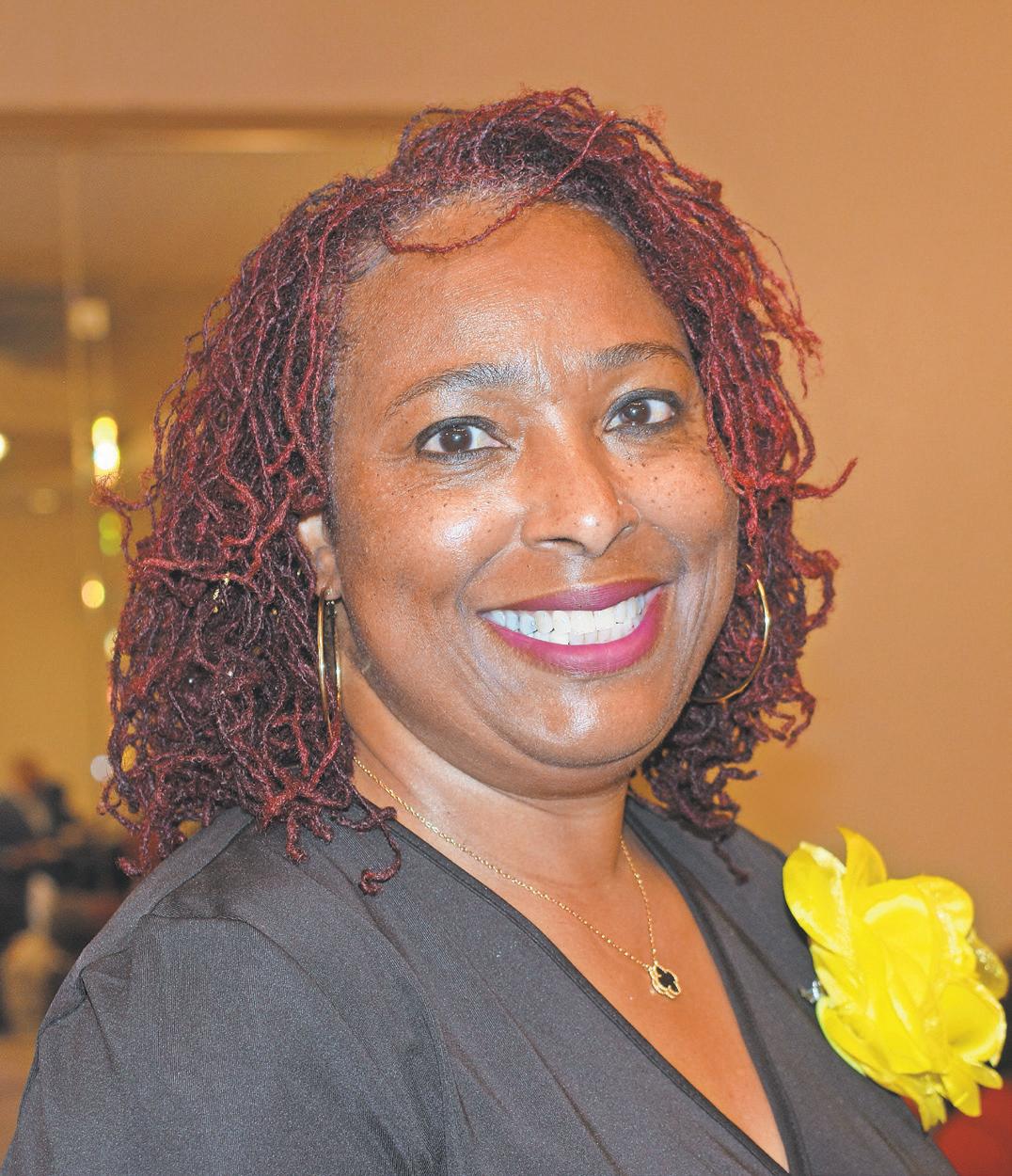
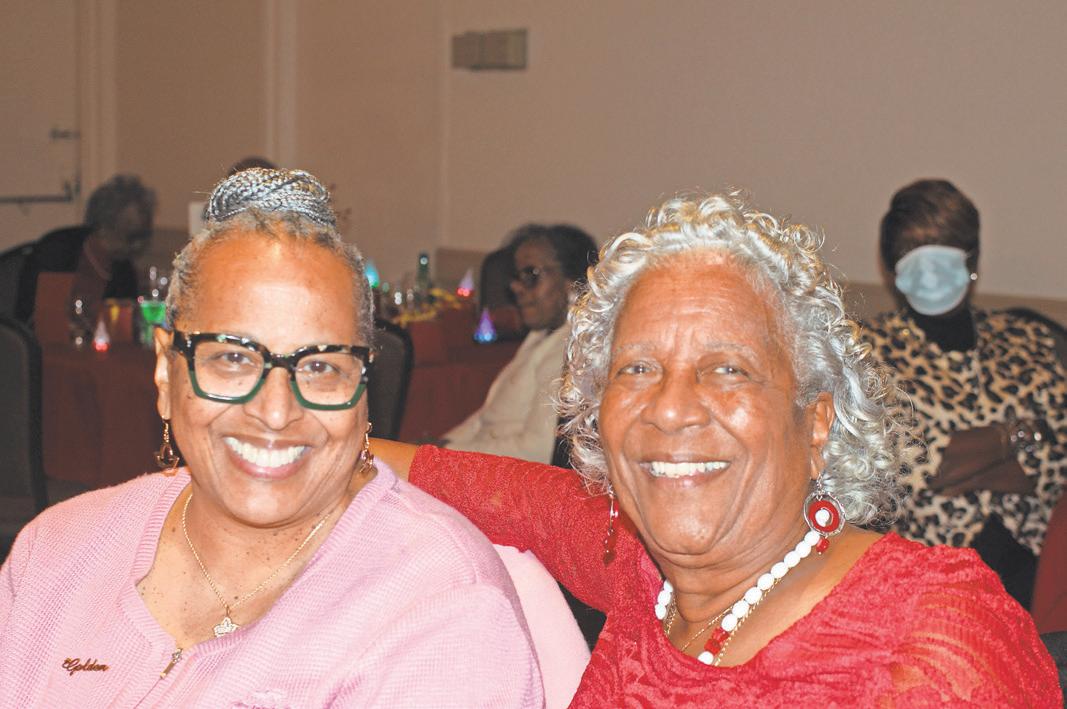


By Tashi McQueen AFRO Staff Writer tmcqueen@afro.com
Across the nation, male-centered organizations are expanding services to ensure Black men and boys have access to resources that help them confront mental health challenges and prevent suicide.
From national to local initiatives, these groups are integrating mental health awareness into their missions, seeing it as key to Black male wellness.
At the national level, Tasnim Sulaiman, founder and CEO of Black Men Heal, and Zakia Williams, its co-founder and chief operating officer, provide Black men with culturally informed mental health care.
“Black Men Heal was created to be a disruption to an already broken mental healthcare system,” said Sulaiman. “Intergenerational trauma and systemic racism have taken a toll on the mental health and well-being of the Black community.”
According to “Deconstructing Stigma: Changing Attitudes About Mental Health,” only 25 percent of Black Americans seek mental health care, compared to 40 percent
of White Americans. Williams said this disparity stems from a lack of tailored resources, stigma and high costs.
Black Men Heal bridges the gap by offering free therapy sessions with licensed and pre-licensed clinicians of color who often share similar experiences. The organization also provides safe spaces for Black men to address struggles and heal from trauma. Virtual groups, such as King’s Corner and Gun Violence Group therapy, allow men to share struggles and encourage one another.
“The healing power of connection, without judgment, can transform perspectives, enhance relationships and profoundly impact lives,” said Williams.
Locally, the G.R.O.W. Program, a Baltimore-based nonprofit led by CEO Diwee Sewell, supports youth ages 9-17 in health, wellness, emotional intelligence and workforce training. The G.R.O.W. Program includes initiatives such as Cash App Classroom, which teaches financial literacy, and Learn to Earn, which provides paid occupational skill development.
“We provide male counselors
who are culturally aligned – from the same community that’s tapped in with the culture,” said Sewell. “We also figure out the interests of participants and shape programming around those interests as a way to develop strong bonds.”
Ahkeem Fretman, 31, who benefited from the G.R.O.W. Program, describes it as a brotherhood.
“The G.R.O.W. program is basically like a mentorship and big brother program, where you can learn skills that you need in the real world,” said Fretman. “It’s like a family. Nobody is bigger than the next person. We’re all still students, we’re still learning from each other.”
As a man with attention-deficit and hyperactivity disorder (ADHD), Fretman knows first hand how Sewell and the G.R.O.W. Program can help young men navigate mental health.
“He helped me calm down, listen and pay attention,” said Fretman. “I’ve seen him work with kids with different disorders and from what I see, he’s very patient with them and communicates well.”
Sewell said G.R.O.W. uses cognitive behavioral therapy and dialectical behavior therapy.
By Laura Ungar
Shilpa Gajarawala struggled with hot flashes, night sweats, sleep problems and brain fog. But given her history of breast cancer, treating these menopausal symptoms with hormone therapy wasn’t an option.
“For two years, I tried to kind of power through,” said the 58-year-old physician assistant from Jacksonville, Fla.
But doctors say women like Gajarawala don’t need to suffer.
Though many women take hormone therapy medications to ease menopause symptoms, recently announced label changes may encourage even more to start. But others choose not to use these medications that circulate throughout the body. And doctors advise some to avoid them because they have medical problems such as severe liver disease or a history of heart attack, stroke, blood clots or a type of breast cancer that grows in response to hormones such as estrogen.
For those people, there are lifestyle changes, medications without hormones and other strategies that can help.
“The key here is that there’s something for everybody,” said Dr. Stephanie Faubion, medical director at the Menopause Society. “There’s always a solution. We have lots of other options available.”
Boosting physical activity can make a difference. While exercise hasn’t been shown to alleviate menopausal symptoms directly, it can help to shed pounds, which is associated with reductions
“The key here is that there’s something for everybody. There’s always a solution. We have lots of other options available.”

in hot flashes and night sweats.
Doctors suggest a mix of aerobic exercise, such as running or walking, and strength training, which slows the loss of bone density.
Along with exercise, doctors advise watching what you eat.
Emerging science shows that a “plant-forward diet,” rich in produce and soy and low in oil, may help with managing hot flashes in particular, said Faubion of the Mayo Clinic Center for Women’s Health. Experts aren’t sure why this is true, but some suggest it may be because it also helps with weight loss.
Another key, doctors said, is to avoid things in the diet that may trigger hot flashes, like caffeine or alcohol.
Eating well and exercising also help with other midlife health issues, like rising heart and diabetes risks.
During menopause, the body’s production of the hormones estrogen and progesterone declines greatly. The drop in estrogen levels can lead to higher blood pressure and cholesterol.
“It’s important that we focus on maintaining cardiovascular health” such as stopping smoking, getting enough sleep and watching stress levels, Faubion said.
Prescription drugs
Beyond lifestyle changes, some nonhormonal prescription medicines have been shown to ease menopausal symptoms.
Antidepressants can help with hot flashes and mood issues. Recent data suggest that a drug for an overactive bladder called oxybutynin may reduce hot flashes while also treating frequent urination that’s common during menopause.
And doctors pointed to a new drug on the market – Veozah, a brand name for fezolinetant — which works in the area of the brain that

CEO of Grow Community Care and the G.R.O.W. Program, mentors Baltimore youth, providing culturally aligned guidance, mental health support and programs that teach life skills and workforce development.
Fretman added that Sewell often makes sure to speak with youth, give incentives and show them how to correct mistakes.
“We teach them the power of thought,” said Sewell. “To replace negative thought patterns and
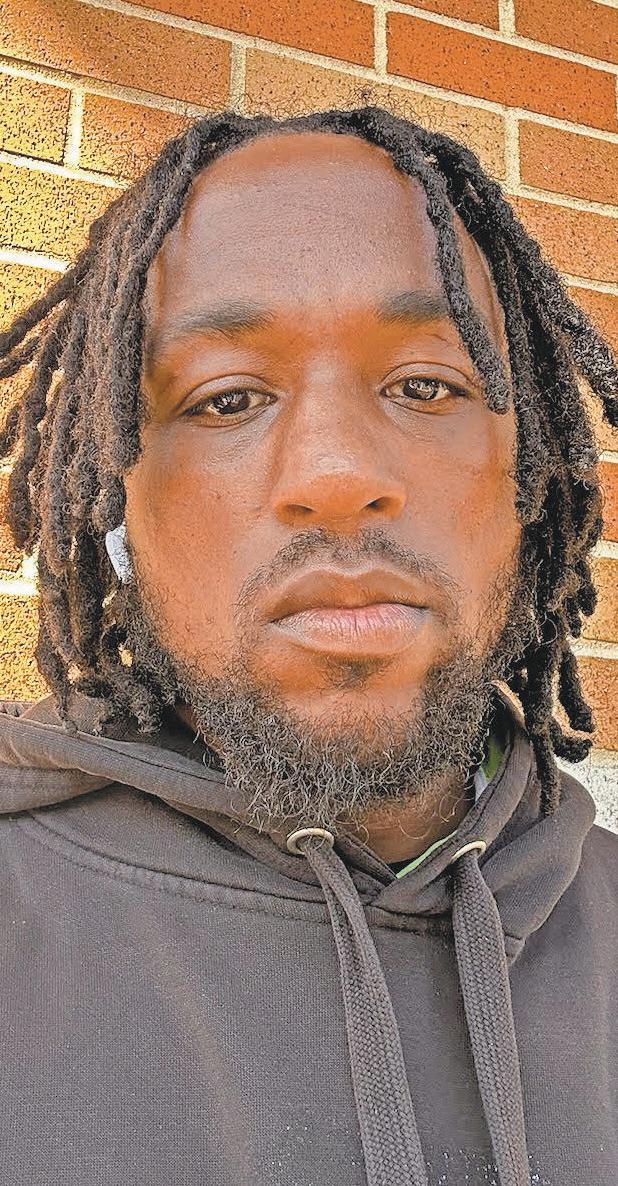
and
and
for
replace them with positive thoughts. We help them to develop problem solving and coping skills.”
For parents seeking a safe place for their child to learn and grow, Fretman recommends the G.R.O.W. Program.
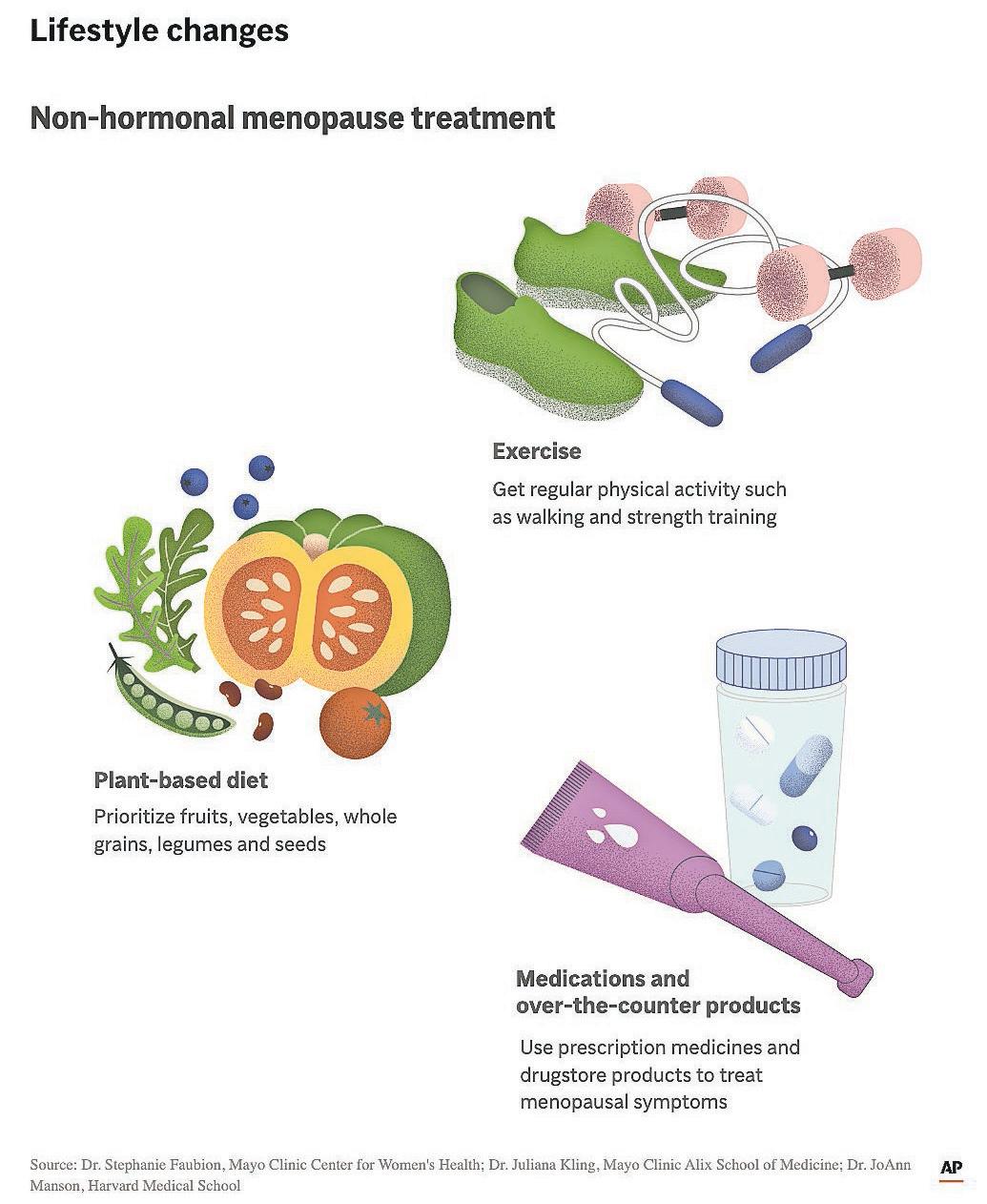
controls body temperature and blocks a source of hot flashes and night sweats. Another nonhormonal drug called elinzanetant — marketed as Lynkuet — was recently approved by the U.S. Food and Drug Administration. It works similarly, except it blocks two molecules in the nervous system instead of one.
One downside of such medications? Possible side effects.
Veozah’s label includes a federally required warning about the risk of a rare but serious liver injury. Lynkuet’s possible side effects include difficulty staying awake, fatigue and others. Some antidepressants can cause weight gain, although generally in doses higher than those used for menopause symptoms. And oxybutynin can cause dry mouth and, in some people, a condition in which they can’t completely empty the bladder.
“There’s no medication out there that’s entirely free of risk,” said Dr. JoAnn Manson at Harvard Medical School.
Other nonhormonal options
Over-the-counter products can also treat some menopausal symptoms. Lubricants available at drugstores can help women struggling with vaginal dryness.
Cognitive behavioral therapy, which focuses on changing unhealthy thought patterns and
behaviors, has been shown to help women cope with hot flashes.
“It’s not like it’s going to make you not have a hot flash,” Faubion said. “But it makes them less significant for you and less burdensome.” Manson said there’s “moderate evidence” that clinical hypnosis might also help, with some studies showing reductions in the frequency and severity of hot flashes.
“That seems a promising option,” she said. “But more research is needed.”
The bottom line is that women don’t have to simply “get through” menopause, said Dr. Juliana Kling, a women’s health expert at Mayo Clinic Alix School of Medicine in Arizona. “I would implore women to have that conversation ... about what treatment might be beneficial for them.”
Gajarawala did that. She now skips red wine, walks at least 10,000 steps a day, practices tai chi and takes an extended-release antidepressant to address her symptoms.
“It’s been a significant improvement,” she said. The Associated Press Health and Science Department receives support from the Howard Hughes Medical Institute’s Department of Science Education and the Robert Wood Johnson Foundation. The AP is solely responsible for all content. This article was originally published by The Associated Press.

By Andrea Stevens AFRO Staff Writer astevens@afro.com
Gospel artist Maurette Brown Clark is no stranger to the spotlight, but she remains grounded in purpose, humility and a clear sense of calling. With a career that has spanned decades, she continues to evolve while staying rooted in the faith that launched her into music ministry.
It’s a career with a strong foundation laid in the early years of her childhood.
“Music met me at my house when I got home from the hospital after I was born,” Brown Clark said. “My dad was a singer. My mother had me take classical piano lessons. I did that for nine years. It wasn’t ever a part of the dream of what I wanted to do... Little did I know that the plan God had for me was bigger than what I did.”
That inner tug led to a heartfelt prayer for clarity, and an answer that would change the trajectory of her life and career.
“I prayed and asked God, ‘Tell me what it is that you put me on earth to do.’ And He told me, clear as day, ‘Since I saved you, I want you to help someone else get saved.’ I said, ‘How?’ He said, ‘Use your voice and sing.’ I was like, ‘got it,’” she recalled.
That moment led her to become one of gospel’s most respected voices, with chart-topping hits like “I Just Want to Praise You” and “It Ain’t Over (Until God Says It’s Over).” One of her early career milestones was winning a Stellar Award for Best New Artist in 2000.
“That was always something that I thought would never happen for me. I never even dreamed that dream... It just assured me that God had me on his mind,” she said.
“... God still has me on his mind, and He’s still doing new things with me even though I’ve been at this a long time.”
Before she ever stepped on a gospel stage, Brown Clark thought she had already mapped out her future. With the pieces of a traditional life falling into place, she felt a quiet but undeniable void that pushed her to seek deeper meaning.
“I had a college degree, a boyfriend that would become my husband... a job, I had a car, I had all the things that people pursue in terms of a good life, and yet I still felt like there was a hole in my heart,” she said.
Brown Clark’s career reached another high point in 2023 when she performed at the Kennedy Center as a solo artist in tribute to Richard Smallwood.
“To be able to sing my music as a standalone artist in such a great venue...was really a great moment for me,” said Brown Clark. “It let me see that God still has me on His mind, and He’s still doing new things with me even though I’ve been at this a long time.”
Her 2023 album, “He Loves

Me,” marked a turning point both musically and personally. The album received nominations for both Stellar and Dove Awards.
“I like to call it my freedom project. This was a project where I got to make all the decisions,” she said. “To be able to put out a new project was really a blessing,” she said.
Gospel music has long impacted those of all ages that listen to it.
Ashia Bello, a member of Anthony Brown and Group Therapy and a Stellar Award winner herself, echoed that sentiment.
“Gospel music reaches young people in the space where culture can’t,” said Bello. “It connects them back to God and speaks on matters of the heart on a kingdom level.”
Looking ahead to 2026, Brown Clark is planning a tour, which could come at a good time for gospel music fans.
Contemporary Christian Music (CCM) has grown in listeners in recent years, “39 percent of CCM’s listenership in 2021 was made up of millennials or younger. Today, that number has risen up to 45 percent, with signs of growth,” according to the National Public Radio. “The dynamic shift of CCM’s customer base has necessitated a change in marketing strategies, with less priority on radio and physical products and more emphasis on streaming and social media.”
Brown Clark says now is the time for listeners to reconnect with her timeless hits and new material.
“I want to do a tour next year that connects the dots...singing more songs off of my projects and introducing new ones as well,” she said. “I’ve got big goals in 2026, but I’m definitely going to get them all.”
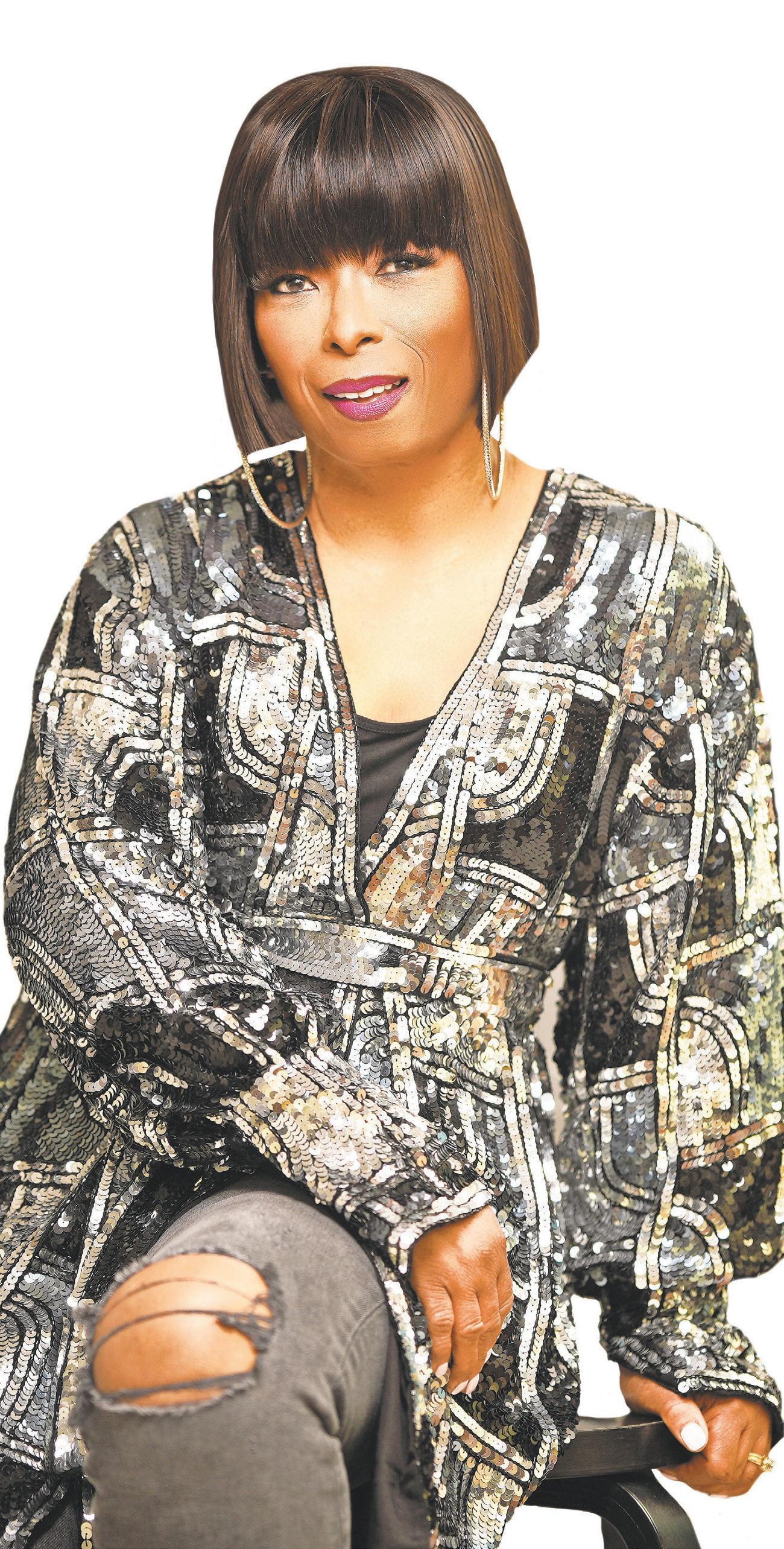
By Rev. Dorothy S. Boulware Word in Black
Rev. LaTeka Graham is a champion at going against the flow.
In an era when a majority of professionals, including ministers, demonstrate their worth through sheer busyness — starting early and staying late, packing the workday with meetings and tasks, refusing to take breaks — Graham’s ministry centers on rest. She sees it as, arguably, life’s most valuable commodity and a spiritual requirement, albeit one that is too often neglected.
She’s seen it often: clergymen and women carrying an invisible burden, “leading others while quietly running on empty,” Graham says. But, she says, rest “is not a reward after the work; it’s a command woven into our calling.”
That dynamic inspired her to write and publish her first book, “With Uplifted Hands — Rest.”
It’s a 30-day devotional written especially for ministers, she says, designed to help them “rediscover the beauty of surrender, reflection, and spiritual renewal.”
Although she elevates rest as a spiritual practice, Graham is no slacker.
She’s an ordained minister with a master’s degree. Graham and her husband have been married for 20 years, and they have raised two children. Her ministry

helps connect faith visionaries with people and resources and guides them along a trajectory toward their desired outcomes.
“With every sermon, consultation and written word, I seek to guide leaders back to Christ, the true source of rest, renewal and resilience,” she says. Graham recently sat down with Word In Black for an interview. It has been edited for length and clarity.
Word in Black: What inspired you to write ‘With Uplifted Hands — REST”?
LaTeka Graham: “I was inspired by the weight I saw so many ministry leaders carrying. God reminded me that rest is not a reward after the work; it’s a command woven into our calling. “With Uplifted Hands — REST” was born from that revelation.
WIB: What makes this devotional different than other leadership devotionals?
Graham: Most devotionals focus on productivity, growth, or endurance. My book centers the conversation on stillness and on being, not just doing. It gently calls leaders to lay down the weight of performance and rediscover the peace of God’s presence. It’s both profoundly spiritual and deeply practical, giving leaders permission to pause without guilt.
WIB: Who is this devotional written for?
Graham: It’s written for pastors, ministry directors, worship leaders and anyone in Christian leadership who pours out more than they receive. But honestly, it’s also for anyone who’s ever felt weary in doing good. If you’ve ever prayed, “Lord, I’m tired,” this devotional is for you.
WIB: Why did you choose the title“With Uplifted Hands”?
Graham: “Uplifted hands” symbolizes both surrender and strength. It’s the posture of worship and the posture of rest, giving God control while receiving his peace. The title reminds readers that rest is found not in retreating from God’s work but in remaining connected to God’s presence.
WIB: How is the book structured, and how should readers use it?
Graham: Each of the 30
days includes a short devotional, a reflection question, a prayer and a leadership challenge. It is designed to be completed in just a few quiet minutes a day. The goal is to create space for intentional pause, helping leaders shift from striving to resting in God’s promises.
WIB: What do you hope readers take away from this devotional?
Graham: My prayer is that readers will walk away with renewed strength and a gentler rhythm of grace. I want them to realize that rest is not weakness; it’s wisdom. That God does some of his greatest work not in our hustle but in our stillness. Resting is how we remain effective, anointed, and aligned with God’s purpose.
WIB: How does this devotional connect to your ministry, LRG Ministries?
Graham: With “Uplifted Hands — REST” reflects the heart of LRG Ministries — helping ministry leaders lead from a place of health, wholeness, and holiness. Through our leadership training, mentorship and devotionals, we equip leaders to serve with clarity, confidence and compassion; always remembering that the best leadership flows from a rested soul.
This article was originally published by Word in Black.

SUPERIOR COURT OF THE DISTRICT OF COLUMBIA
PROBATE DIVISION 2025ADM001128
GERALD W. EDWARDS Name of Decedent
MICHELLE BELL, ESQ. 9701 APOLLO DRIVE, SUITE 381 LARGO, MD 20774 ATTORNEY Notice of Appointment, Notice to Creditors and Notice to Unknown Heirs
BENITA EDWARDS WILSON, whose address is, 415 MILFORD MILL ROAD, PIKESVILLE, MD 21208 was appointed Personal Representative of the estate of GERALD W. EDWARDS who died on JULY 9, 2023 without a Will and will serve without Court supervision. All unknown heirs and heirs whose whereabouts are unknown shall enter their
whose address is 3239 THEODORE R. HAGANS DRIVE., NE, WASHINGTON, DC 20018 was appointed Personal Representative of the estate of JANICE E. WASHINGTON who died on JULY 26,2021 with a Will and will serve without Court supervision. All
LORRAINE Y JONES

SUPERIOR COURT OF THE DISTRICT OF COLUMBIA PROBATE DIVISION 2025ADM001244 Estate of ELEANORA B. CRAWFORD AKA ELEANORA BRAXTON CRAWFORD Deceased NOTICE OF STANDARD PROBATE (For estates of decedents dying on or after July 1, 1995)
Notice is hereby given that a petition has been filed in this Court by GREGORY H. CRAWFORD
lication of this notice, the Court may take the action hereinafter set forth.
*admit to probate the will dated DECEMBER 1, 2022 exhibited with the petition upon proof satisfactory to the Court of due exe- cution by affidavit of the witnesses or otherwise
*order any intrested person to show cause why the provisions of the lost or destroyed will dated DECEMBER 1, 2022 should not be admitted to probate as expressed in the pettition
*in the absence of will or proof satisfactory to the Court of due execution, enter an order determing that the decendent died intestate
*appoint an unsupervised personal representitive Date of first publication: NOVEMBER 21, 2025
Names of newspapers: Daily Washington Law Reporter AFRO American Newspapers GREGORY H. CRAWFORD 11912 AUTUMNWOOD LANE FORT WASHINGTON, 20744 Signature of Petitioner/Attorney Register of Wills Clerk of the Probate Division 11.21, 11.28.25





























































































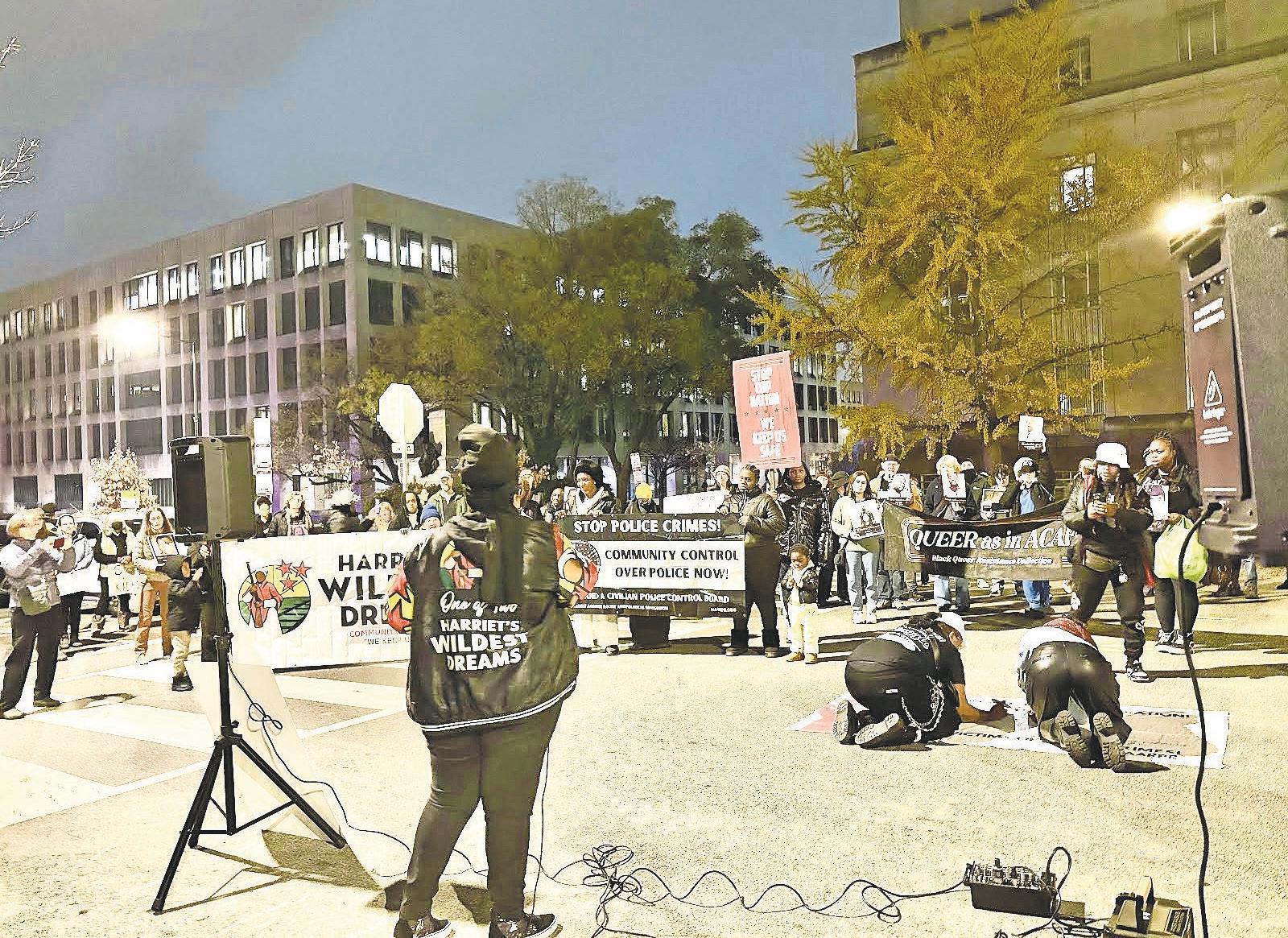

Frankie Seabron, program manager of the Black-led community defense organization Harriet’s Wildest Dreams, stood on the corner of Indiana Ave. and Fourth St. NW to honor victims of police violence. The activist gathered with others following the recent deaths of three Black men who were fatally shot by the Metropolitan Police Department (MPD) and Metro Transit Police Department (MTPD).
“We will not normalize, we will not accept, it is not OK!” Seabron called out to the crowd of organizers surrounding her at a vigil and rally on the evening of Nov. 21.
The event took place in front of Metropolitan Police Department headquarters. Social justice organizations such as Free DC, Harriet’s Wildest Dreams, Black Lives Matter DC, Freedom Road Socialist Organization and more were in attendance.
The men killed by police all had their lives taken within four
days of each other. Their names were David Warren Childs, Demetruis Alston and Kevin Booker.
Childs, a 25-year-old from Northeast, was shot on Nov. 17 by an MPD officer following a chase and altercation after officers reported seeing a firearm on his waist, according to an MPD statement.
Alston died while in the custody of transit police on Nov. 16 at Anacostia Metro Station. Alston was a Washington, D.C., native.
Booker, a 41-year-old from Northwest, died in his home on Nov. 14 at the hands of an MPD officer. The officers were reported to have entered the home through an unlocked door while issuing loud commands. According to the MPD, Booker is reported to have “lunged at the officer with a knife and screwdriver” prior to being fatally shot.
“We’re out here in support of the victims, their families, and also just trying to build community so people understand there are multiple organizations out here trying to do something
about the injustice,” shared Kai, a 23-year-old resident and member of the DC Alliance Against Racism and Political Repression (DCAARPR), who did not want his last name mentioned.
The rally featured brief speeches from various members of the Washington, D.C., community, including the family and friends of some of the men killed by the police. April Goggans, a core organizer with Black Lives Matter DC, joined the family of Alston in sharing a few words on the life and character of their loved one.
“We are asking everyone in D.C. who hears Demetruis’ name not to take the police’s words as the truth simply because they wear a badge or hold a title,” Goggans recited from a statement made by Alston’s family. “The world deserves to know Demetruis. Not the version being created to justify what happened to him. Every person deserves to be remembered as their full authentic self.”
Following the implementation of President Donald Trump’s
“Make the District of Columbia Safe and Beautiful” executive order in August, the increased presence of federal officers on the streets of Washington, D.C. has caused safety concerns for residents and visitors.
“I just feel a sense of overwhelmed-ness,” said one vigil and rally attendee, who did not want to go on record with her name. “It’s at a point where it’s not comfortable to continue on every day without coming out and actually supporting people who are in the middle of this occupation. “Although it’s horrible stuff that’s happening, we’re still here together.”
The worry of what will ensue is accompanied by the need to lean into what Washingtonians have: a strong sense of community. As organizers continue to take to the streets, they have found a sense of strength and support in one another.
“I’m in deep, deep grieving,” said Kai. “The only reason I keep going is because of the community support that is available through vigils like this and also through DCAARPR in general.”
By D. Kevin McNeir Special
Washington, D.C., officials are decrying federal legislation that, they say, pose as threats to Home Rule – the law which has allowed the District to self-govern since 1975.
On Nov. 17, the House Rules Committee considered 13 D.C.-related bills. Ahead of the vote, the District’s delegate to Congress, Eleanor Holmes Norton, released a statement that criticized the motivations of legislators, specifically Republicans in the House, who represent far-away constituencies yet continue to promote bills that undermine the autonomy of the District.
“D.C.’s local legislature, the D.C. Council, was elected by D.C. residents. Its members are accountable to D.C., and they are the appropriate elected officials to dictate D.C. laws,” Norton said. “It is paternalistic and condescending for Republican members of Congress to substitute their own judgment for that of D.C.’s local legislature.”
The Democrat also pointed out the disparity between the rights afforded
to residents of other U.S. states compared to Washingtonians.
“D.C. residents have all the obligations of American citizenship, including paying federal taxes, serving on juries, and registering with the Selective Service,” she said. “Yet Congress denies them full local self-government and voting representation in Congress. They deserve full control of their own local affairs.”
Two of the proposed bills have previously elicited significant public scrutiny – the first bill, introduced by Rep. Elise Stefanik (R-N.Y.), that would require mandatory pretrial and post-conviction detention for certain crimes; and the second bill, introduced by Rep. Andrew Clyde (R-Ga.), which would repeal D.C.’s Comprehensive Policing and Justice Reform Amendment Act of 2022.
Congressional Black Caucus (CBC) Chair Yvette D. Clarke (D-N.Y.) said the group opposes efforts led by House Republicans to legislate crime in Washington, which counter decisions supported by voters and elected officials, with
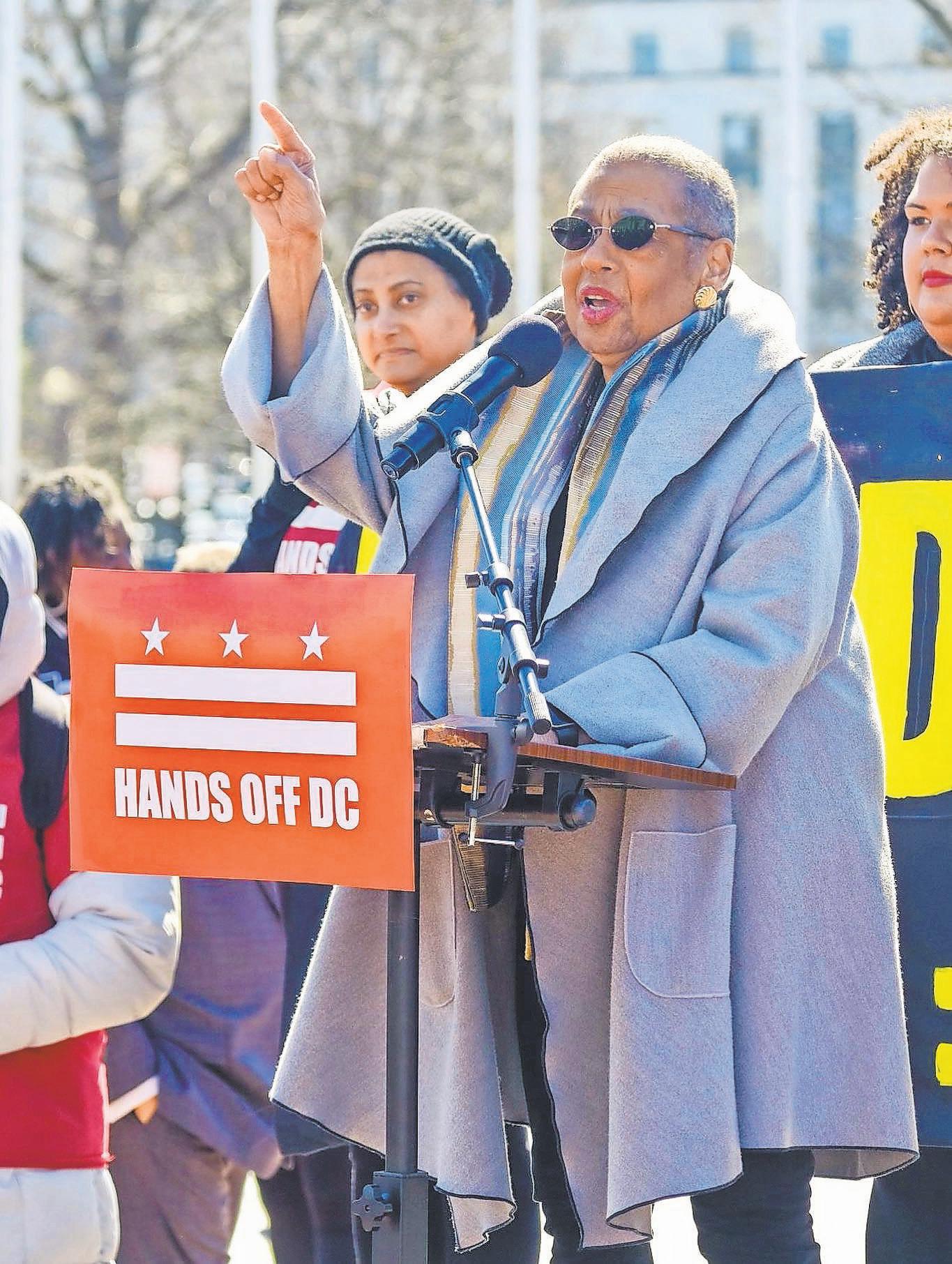

By Megan Sayles AFRO Staff Writer msayles@afro.com
Despite gaining four new grocery stores in the past year, food access in Washington, D.C. remains uneven from ward to ward. A new report from D.C. Hunger Solutions shows that while grocery options expanded in some wards, residents east of the Anacostia River continue to experience limited access.
The report, “Minding the Grocery Gap in the District of Columbia,” found that wealthier, predominantly White wards, such as Ward 1, have 13 full-service grocery stores, while Wards 7 and 8, home to mostly Black residents, have just three and four stores, respectively. LaMonika Jones, director of D.C. Hunger Solutions, emphasized that the shortage has serious consequences for District families.
“The persistent lack of grocery stores in communities experiencing food insecurity makes it challenging for families and households to do what is very basic, which is being able to purchase food to feed themselves and their families,” said Jones. “Not having access to grocery stores makes it challenging for residents in these communities to access basic needs items in addition to food, like medication and baby formula.”
Jones pointed out that food access is often shaped by a combination of economic stability, affordability, cost of living and access to transportation. According to the report, in Wards 7 and 8, the median household income is $69,109 and $50,931, respectively, and more than 20 percent of people live below the poverty line. They are also among the most populous wards in D.C., having more residents than Wards 1, 2, 3, 4 and 6. Yet, they have the fewest number of grocery stores.
While the report underscored these disparities, it also highlighted efforts by organizations, like D.C. Central Kitchen, that are helping to close gaps and improve food access for marginalized communities. D.C. Central Kitchen’s Healthy Corners initiative delivers fresh and frozen fruits and vegetables to corner stores in low-income communities,

By Deborah Bailey AFRO Contributing Editor
At Washington, D.C.’s Social Justice Charter School, social justice is a concept that extends beyond a classroom or a unit studied in honor of Dr. Martin Luther King Jr. Day. Social justice is the theme that permeates the entire school, influencing every aspect of classroom and school activities.
Since 2020, the D.C. Social Justice Charter School has been a home away from home for 100 sixth through eighth graders and their families who have signed on with enthusiasm to the school’s challenge of becoming the next generation of “scholar-activists.”

of Northeast D.C. and was planned by co-founders Myron Long and Brandon Johnson with the involvement of the community, the school organizers emphasize. Long and Johnson said the school, now in its fifth year, represents not only their vision, but the values of the community—a concept that the two educators with roots in the communities near the school said was crucial.
Building a school with the community
The school sits near the Maryland-D.C. border in the Lamond-Riggs community
offering store owners affordable, smaller-quantity options that make healthy food more accessible to local residents. Partner stores sell the produce at below-market prices, helping to ensure it’s affordable for shoppers.
“It’s one thing to make a healthy choice at a grocery store— especially if you can only visit once a month because it’s hard to get there and your SNAP benefits only go so far. But, what about making healthy choices day-in and day-out after working a shift at your second job or as a kid walking home from school?” said Alexander Justice Moore, chief development officer for
D.C. Central Kitchen. “Healthy Corners helps make nutritious choices affordable and accessible at the same time, with community input driving what stores stock and sell.”
In the past year, Healthy Corners served more than 55 small businesses, enabling them to sell more than 480,000 units of produce to low-income families. It also helped more than 22,000 Supplemental Nutrition Assistance Program (SNAP) recipients take advantage of its special, “SNAP Match,” incentives, giving them $5 in bonus produce with each purchase of fruits or vegetables.
“We’re helping families stretch their dollars, make
“We have a principle of building with the community, not just for them,” said Long, who anchors the external-facing administrative leadership of the charter school. “We wanted to make sure our
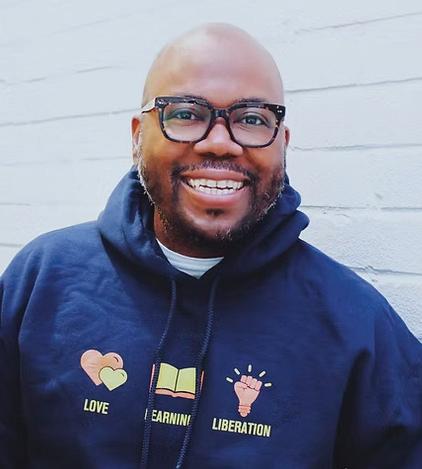
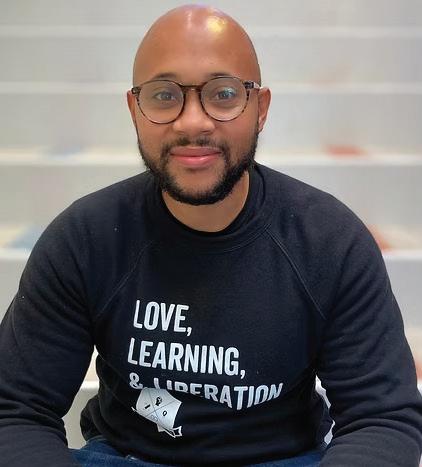
school served the needs of the community. We’ve seen charter schools that come in without the input of the
community and colonize them,” Long added.
“We’ve graduated three classes. Most of the parents
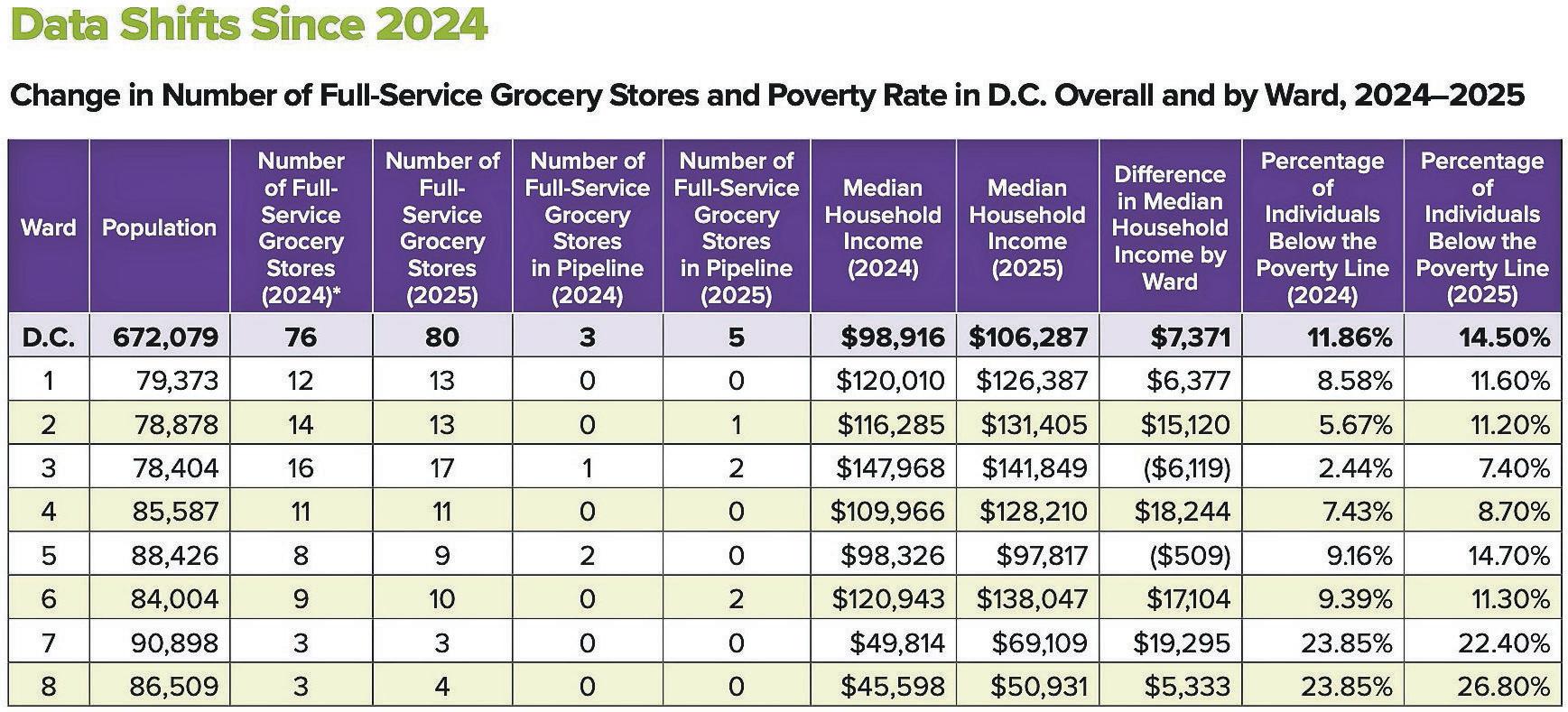
healthy choices and support local businesses all at the same time,” said Moore. However, efforts like Healthy Corners may face new

•
challenges as federal changes to SNAP take effect. Jones said the program, long the nation’s primary safety net against hunger, will soon require able-bodied adults without dependents to complete 80 work hours per month to remain eligible. For the first time, SNAP clients ages 55 to 64 will also need to meet these requirements, and exemptions for unhoused residents, veterans and former foster youth will be removed.
specific reference to the two bills introduced by Reps. Clyde and Stefanik.
“These bills are nothing more than another blatant attempt to strip residents of their right to self-governance, roll back police accountability reforms, and reimpose discriminatory cash bail practices against the will of residents and D.C.’s elected officials,” Clarke said in a Nov. 19 statement. “Despite the Trump Administration’s continued claims that violent crime in D.C. is increasing, the Republican-led review of the Metropolitan Police Department has confirmed what we have long known: crime in D.C. is declining.
“The CBC strongly opposed these anti-D.C. home rule bills and will continue fighting to protect D.C.’s right to self-governance,” the statement continued. “We will continue to oppose any effort to silence D.C. residents, and we call on our colleagues to reject these harmful, anti-democratic pieces of legislation and join us in the work to advance D.C. statehood.”
While neither of the two bills introduced by Reps. Stefanik and Clyde were approved by the House, two others received the necessary notes and were advanced to the Senate for their consideration.
The first, the D.C. CRIMES ACT, introduced by Rep. Byron Donalds (R-Fla.),
“These additional restrictions will negatively impact District residents relying on SNAP, pushing households further into food insecurity,” said Jones.
On the ground, D.C. Central Kitchen and other organizations are already responding to these changes. The organization is serving up to 500 additional emergency meals to residents in need each day.
“There is understandable
would have changed the age at which a court is allowed discretion to impose alternative sentences on a person from 24 to 18. The second, introduced by Rep. Brand on Gill (R-Texas), would have lowered the age minors can be tried as adults in D.C. to 14 years old.
Norton voiced her discontent following the House vote.
“Today’s vote is yet another shameful assault on the democratic rights of more than 700,000 taxpaying D.C. residents,” she said in a statement. “This is about denying D.C. residents the basic right of self-government that every American deserves and treating the nation’s capital as Republicans’ own fiefdom, democracy be damned.”
Norton further stated that the cycle of “disingenuous partisanship,” in which Republicans take steps to decrease the District’s ability to make its own decisions while claiming to be concerned about the city, must end.
Local D.C. officials, including Mayor Muriel Bowser, Attorney General Brian Schwalb, and D.C. Council Chair Phil Mendelson, have echoed Norton’s sentiments.
“We are united in our forceful opposition to the bills recently advanced by the House Committee on Oversight and Government Reform,” the trio said in a joint statement. “These bills are an affront to Home Rule and the principles of democracy and local self-governance on which this country was founded.
“The District is home to
confusion and concern in many of the communities we serve about what the future of SNAP and other benefits will look like,” said Moore. “We’re working hard to share accurate, trustworthy information with shoppers and store owners alike, ensuring that everyone is using and redeeming benefits in ways that fully comply with the law, and ramp up distributions of emergency food to fill these growing gaps.”
more than 700,000 residents who pay taxes and serve in the military. Like all Americans, they deserve the right to elect local leaders who have the authority to determine the local policies that govern them. We urge members of Congress to reject this unprecedented federal overreach and vote against these bills.”
Since Congress passed the Home Rule Act of 1973, D.C. has had its own government elected by residents. The bill went into effect in 1975 after President Richard Nixon signed it into law, officially establishing the roles of the city council and the mayor, and allowing the District limited autonomy and the ability to pass its own laws. However, the bone of contention has always been the fact that all D.C. legislation requires the approval of Congress.
Unlike states, D.C.’s home rule is not guaranteed by the Constitution, but rather by a simple law. Advocates have long pressed for D.C. statehood because under the Home Rule Act, Congress can unilaterally repeal any of the District’s laws and even abolish D.C.’s government. The ramifications of that vulnerability is no more evident than in President Trump’s decision earlier this year to seize control of the D.C. National Guard and federalize the police department–despite the lack of data to support his claims of rampant crime. It would take an act of Congress, however, if the president wanted to completely take over D.C.
By Andrea Stevens AFRO Staff Writer astevens@afro.com
The Black Wealth Summit will return to Washington, D.C., Dec. 5-6 with a program centered on wealth building, entrepreneurship and economic advancement in the Black community. The event’s theme is “Wealth Reimagined: In The Face of Change” and will take place at The Westin Downtown. It is expected to draw professionals, founders and new investors aiming to strengthen their long-term financial outlook.
The summit’s mission remains a core focus as it enters another year. In an official statement published on the organization’s website, founder Cedric Nash highlighted the purpose guiding the event.
“Since its founding, the Black Wealth Summit has carried a clear mission: to empower Black entrepreneurs, professionals, and families with the knowledge, tools, and strategies needed to build lasting prosperity,” he said. “In 2025, we take this mission further by exploring how innovation, resilience, and adaptability are redefining what wealth means for our community.”
This year’s programming will include sessions on foundational investing, real estate pathways, entrepreneurship fundamentals, business financing, insurance planning and strategies that support long term financial stability. Organizers say the summit is designed to be accessible to participants at all experience levels, bringing together experts who translate complex
Continued from D2
meetings and community interviews have stayed with us,” said Johnson, who was the founding principal of the school and continues to lead the day-to-day academic side of the enterprise.
“They are a family-centered school. I found them to be very open and approachable,” said Alisha Livingston, who lives in the Lamond-Riggs community and is one of the SJCS’s long-time parents. Livingston emphasized that the school has a variety of ways for parents to connect with the school. A weekly ‘robo’ call from school administrators is one of the ways the school stays in touch with every family, in addition to distributing “The Social Justice Times,” a school-wide newsletter and attending neighborhood meetings and events to keep the community close, Long said.
Love, learning and liberation
Social Justice Charter School students receive an education aligned with national, state, and District standards and delivered in a manner that prepares students with the skills to understand life from a social justice perspective.
Social Justice Charter School students approach tasks like preparing for traditional
topics into actionable steps.
According to a report by the Federal Reserve, “the typical White family had a median net worth of $285,000 in 2022; the typical Black family’s median was $44,900, or about 15 percent of the White median.”
The data underscores the scale of the challenge the summit seeks to address.
VIP guests will be welcomed at a reception on Dec. 5, providing early access to networking opportunities.
Workshops and moderated conversations will take place throughout the day on Dec. 6.
A networking reception that evening will give attendees a chance to build professional relationships and exchange insights with speakers and peers.
General admission tickets cost $249 and VIP access is priced at $349. Registration includes meals and access to select sessions and events.
Organizers expect strong turnout from individuals seeking financial guidance and community centered support.
The summit also includes career focused programming, including a job fair intended to connect attendees with employers and organizations working to advance professional opportunities for Black talent. Organizers see these elements as a vital link between financial education and long-term economic mobility.
Past speakers continue to highlight the summit’s emphasis on practical learning.
“The conversations encouraged a strategic and disciplined approach to growing wealth and highlighted actionable frameworks that help founders and rising leaders make smarter financial
parent-teacher meetings by leading the process.
Love, learning and liberation are the school’s major themes, so basic activities that all schools share, like a parent-teacher meeting, are re-imagined and called “parent, student, teacher conferences.” Students take the lead in connecting with both their parents and teachers in conversations about student academic progress.
Zakaria Kello, 11, showed

decisions,” said Terrance Orr, CEO and managing partner at Next Anomaly Group and a workshop speaker in 2022.
The summit remains part of a broader national effort to expand access to financial tools that support generational wealth. Additional information on programming and registration is available on the event’s official site.
soaring in D.C., Long said the students themselves developed the suggestion to connect to the community to support struggling students and families. According to the U.S. Census 2024 American Community Survey, 28.3 percent of District residents under 18 live in poverty.
The Social Justice Learning School is currently partnered with the Health Equity Fund (HEF), which recently expanded a financial assis-
“We have a principle of building with the community, not just for them.”
off some of the projects created in the school’s “Liberatory Design Lab” during her parent, student, teacher conference. Kello creates art that connects with issues and concerns in her life and community.
“Art can represent social justice,” said Kello, who decided to attend the school because of opportunities to become a better leader. “I heard how this school pushes you and helps you move forward,” Kello said.
Partnering with community resources to support the most vulnerable students With child poverty rates
tance pilot program started with the Mothers Outreach Network in 2023. HEF has enabled the charter school to expand the financial assistance outreach program to a 19-month program called “Guaranteed Together.” Forty families in financial need will receive $300 per month, and students will receive $100 per month.
“What we’re seeing right now is that those families can meet their basic needs,” said Long, who wants to see the program expanded to every family that needs financial assistance. “They are less stressed than students who need this, but are not in the program.”


By Patricia McDougall
On Nov. 20, the HBCU Honors Foundation held its third annual HBCU Honors event at the Duke Ellington School of Arts in Washington, D.C. The ceremony honored historically Black colleges and universities (HBCUs) and Black excellence at its best.
Actress and comedian Kym Whitley returned to host the event, serving as mistress of ceremonies. Honorees for this year included Pastor Shirley Caesar,
a Shaw University graduate; Jancie Bryant Howroyd, a North Agricultural and Technical State University alumna and David Banner, a Southern University and A and M College grad.
The star-studded red carpet pulled together celebrities that took to the stage to remind all in attendance of the talent that HBCUs bring to the communities. The event will air on television on Nov. 30 on BET.
AFRO Photos / Patricia McDougall
